Communities

Cultura is affiliated with 51 cultural communities in the Geelong region who each celebrate their diverse cultures by sharing their language, food, dress, music, art and lives together.
Some meet regularly throughout the year, others come together for special events and performances, such as PakoFesta. Most cultural communities warmly welcome new members via the individual contact details or social media pages listed below.
Explore our communities:

Afghan
The Afghan Community was established in Geelong in 2011 . Initially community members were lone men waiting for families to arrive, however, more recently a number of women and families have arrived to join them and members are actively involved in the development of the association.
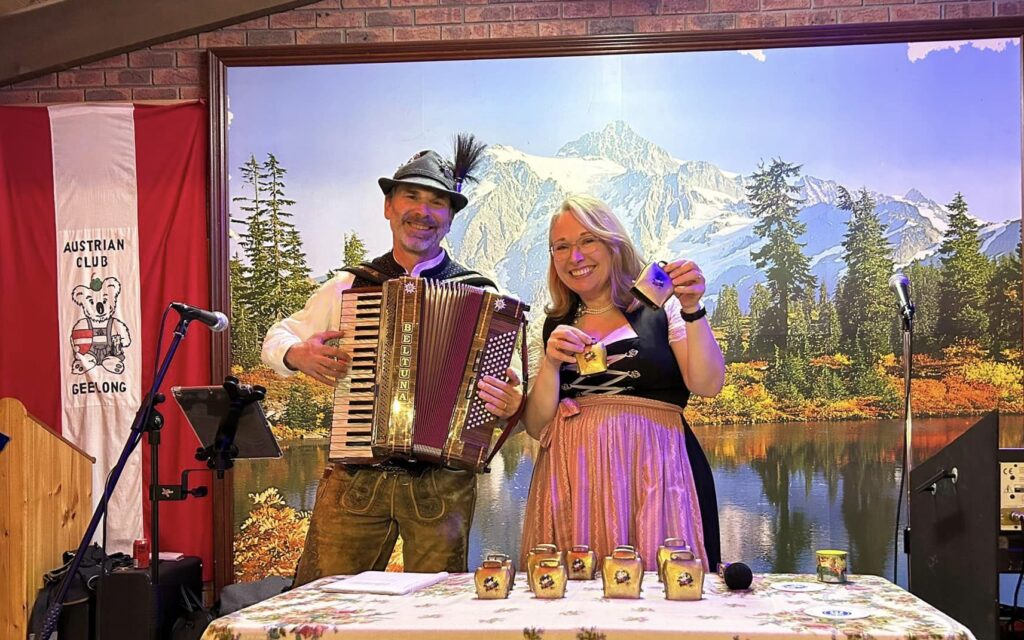
Austrian
The ‘Austrian Club Geelong’ was founded in 1972. Toni Baart, Rudi Hochreiter and Rudi Janda were the driving force behind inauguration, inviting all the Austrians in the Geelong area to the inaugural meeting. Subsequently an enthusiastic and optimistic group of Austrians elected the first management committee with Rudi Hochreiter the first President.
In the early years, all club functions and activities were held in rented premises. The first club rooms were established in 1974 at 99 Little Malop Street in the city. Five years later these were improved and enlarged. As the club grew, the desire to own a club house also increased.
Then in 1986 the members decided to lease land from the ‘Shire of Corio’ for the purpose of building a club house built. In 1988 the club house was completed and a liquor license was obtained one year later.
The Austrian Club of Geelong now has 280 members and is proud to be able to hold all club functions in their own premises. It is to the credit of the Austrians of the Geelong region, who have, through their hard work, commitment, enthusiasm and generous contributions, made it all possible.
ETHNIC RADIO: Augustin Devatti and Ida Zambelli-Hell 3ZZZ 92.3FM (Melbourne)
Find out more:
Contact: Augustin Devatti [email protected]
Community Hall: 240 Plantation Rd, Corio
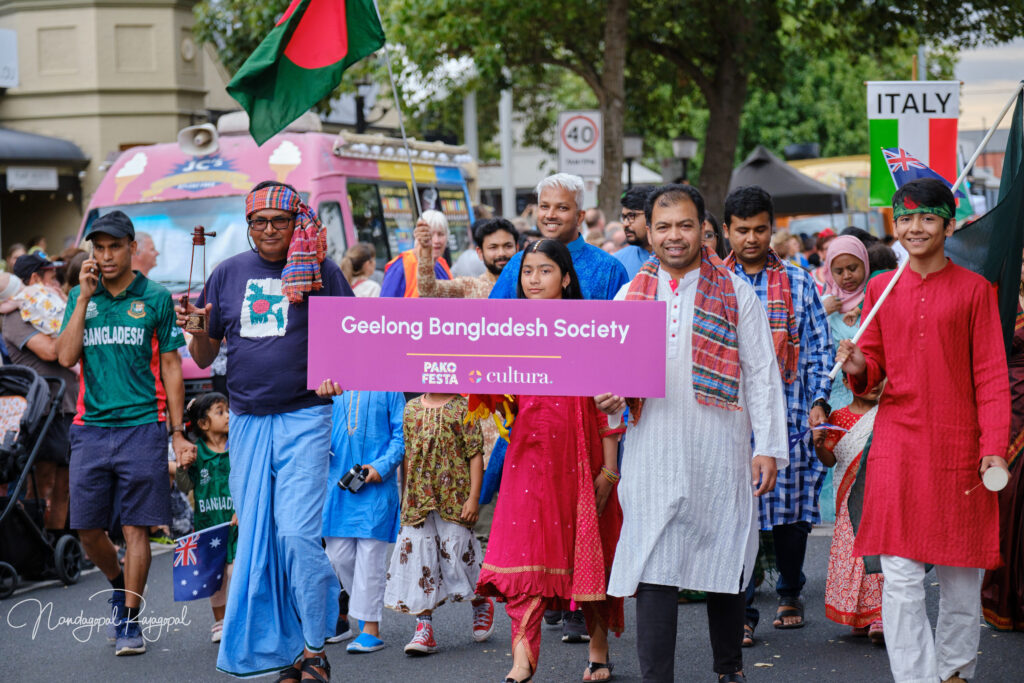
Bangladeshi
Geelong Bangladesh Society (GBS) is a not-for-profit and non-political Bangladeshi community organization based in Geelong consist of Bangladeshi family living in Geelong and surrounding area. It is a Victorian Government’s registered organisation that has been working since 2016 to improve the community well-being of its members.
Reflecting the long history of the region, Bangladesh has a culture that encompasses elements both old and new. The Bengali language boasts a rich literary, which Bangladesh shares with the Indian state of the West Bengal.
The musical tradition of Bangladesh is lyrics-based (Baniprodhan) with minimal instrumental accompaniment. The Baul tradition is a distinctive element of Bengali folk music. Numerous other musical traditions exist including Gobbhira, Bhatiali and Bhawaiya, varying from one region to the next.
Rice is the main Bangladeshi food. Rice, fish curry, and lentil is the most common traditional Bangladeshi food for the general people. Kacchi Biriyani, beef curry, bhuna khichuri and sheek kebab with naan are also common traditional food items. Bangladesh is also famous for its desserts like sweets, rice cakes, rice puddings, and many other desserts in Bangladesh, mostly made from rice and cow milk.
Contact email: [email protected]
Social media page: https://www.facebook.com/groups/558875794207735/?ref=share_group_link
Website: https://gbs.org.au/
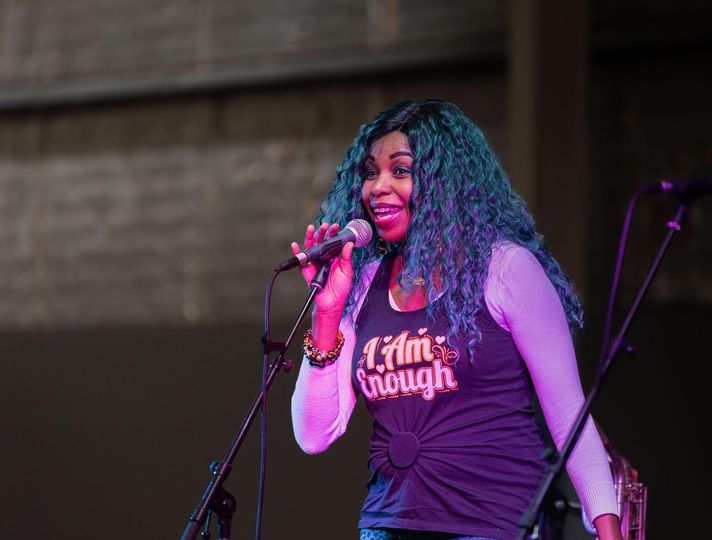
Bantu Collective
Bantu collective incorporated is a newly established organisation that compromises of members from different African countries a which include Zimbabwe, Kenya, Uganda, South Africa, Nigeria , Malawi , Botswana and Zambia.
Bantu tribes belong or relate to a group of peoples in central to southern Africa. The languages spoken include Swahili, Xhosa, and Zulu. It is one of the the largest tribes in Africa.
Ubuntu is an ancient African word meaning ‘humanity to others’. It is often described as reminding us that ‘I am what I am because of who we all are’. We bring the spirit of Ubuntu to Geelong
Our organisation was formed in 2021, an aftermath of Covid-19 pandemic. We were looking for meaningful ways that our community could engage with each other & the wider Geelong community.
By creating opportunities and social platforms in Victoria for our community participation and engagement through celebrating Africa and its cultural diversity.
Our event, Bantu Fest provides the Geelong community and visitors a unique cultural celebration experience and help to build social cohesion. It aims to boost cultural pride, social engagement, communication, awareness of our culture, and knowledge for the Geelong community.
It is a family friendly event. That gives us the opportunity to showcase the positive aspects of our community while breaking down social disconnection
We hope it supports our community’s cultural identity across generations. And increase our
capacity to enhance the lives of marginalized or isolated people in our community by trying to make Geelong their new home.

Brazillian
BAGG – Brazilian Association of Greater Geelong Inc. Is a non-for-profit organization and the Association aims to stimulate and develop, systematizing, the cultural activities in the Greater Geelong and Surf Coast area, also promoting the establishment of recreation activities, parties, events that promote greater social interaction and experience of Brazilian culture.
Brazil has a diverse multicultural history and is a home to many celebrations. Brazilian culture is heavily influenced by a variety of European cultures that have given us the colours, music and cuisine that helped to shape this diverse culture across the entire country. Festivals such as Carnaval (during summer) and Festa Junina and Julina (during winter) bring colours and music across the entire country. Brazil is also famous for its soccer, capoeira, Brazilian jiu-jitsu and dances.
Brazilian cuisine varies greatly by region. This diversity reflects the country’s history. Feijoada, Brazilian Barbeque, Brigadeiros, Pão de queijo, Rice and black beans, polenta, coxinhas, moqueca, coffee are very popular nationwide.
We are pleased to invite you to our traditional Festa Junina (Winter Carnival):
Saturday 29th June
12pm-5pm
Free entry
Oak Tree Place, 25 Anderson Street, Torquay
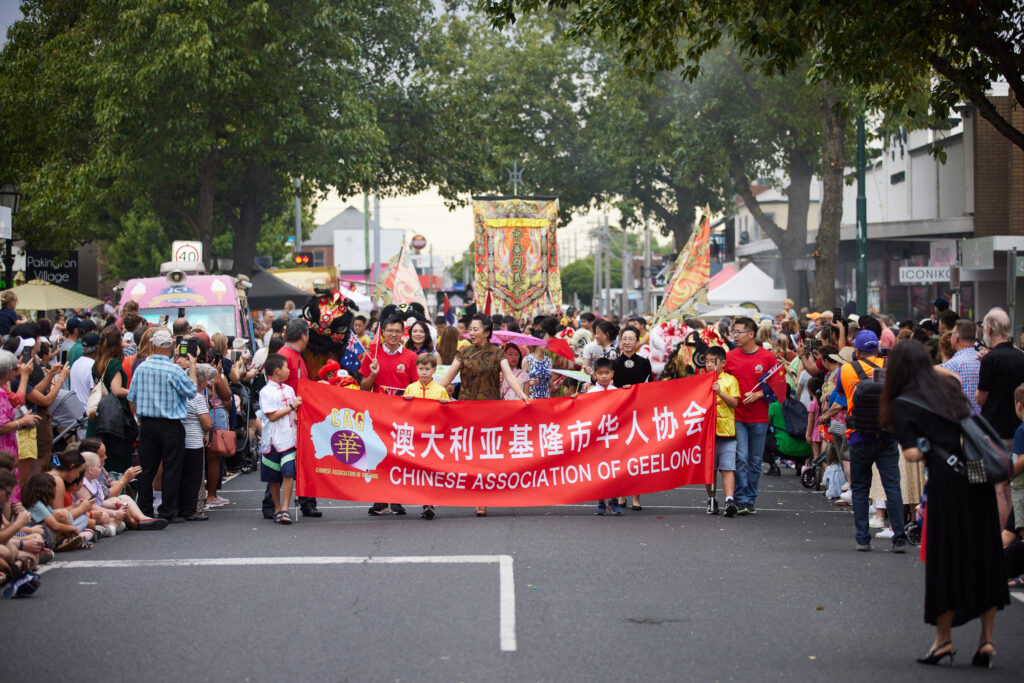
Chinese
The Chinese Association of Geelong started from 1996, it has been operating for over 27 years and currently has over 2000 members.
The early history of Chinese Australians involved significant immigration during mid-19th century due to the gold rush. Since the advent of Multiculturalism as a government policy in the 1970’s, many Chinese from Hong Kong, Mainland China, Taiwan and Southeast Asia (Malaysia, Vietnam, Cambodia, Indonesia and the Philippines) have immigrated to Australia.
After the Tiananmen Square protests of 1989, the Australian Prime Minister of the day, Bob Hawke, allowed students from mainland China to settle in Australia permanently. Since then, immigrants from Mainland China and Taiwan have arrived in increasing numbers.
The community objectives of the Chinese Association of Geelong are to:
- To represent a voice on behalf of the Geelong Chinese community.
- To provide an infrastructure for Chinese families and individuals.
- To assist Chinese families and individuals in being integrated into the Australian society.
- To promote and maintain the Chinese language, culture and traditions in the Geelong community.
Celebration: Most popular Chinese Festivals are Chinese New Year (also knows as Spring Festival), Lantern Festival, Dragon Boat Festival and Middle-Autumn Festival.
Traditional Dress: Qipao, Zhongshan Uniform.
Traditional Symbol: The Celestial Chinese Dragon is considered a symbol of the Chinese race itself. Chinese around the world, proudly proclaim themselves “Descendants of the Dragon”. Dragons are referred to as a divine mythical creature that brings ultimate abundance, prosperity and good fortune.
Art: Chinese calligraphy, traditional water paintings and papercut
Music/Dance: Beijing Opera, Chinese Acrobats, Dragon Dance and Lion Dance
Traditional Instruments: Erhu, Lute (Pipa) and Flute
Cuisine: Spring rolls, Fried rice, Fried noodle, dumplings and Beijing Roast Duck
Beverages: Chinese tea and rice wine.
Find out more: [email protected]

Congolese
Approximately 80 Congolese have recently settled in Geelong and like many other newly settled ethnic groups, they have formed their own association which is affiliated with Cultura. The community celebrates Emancipation of Women Day and Independence Day, commemorating the granting of Independence on June 30th, 1960.
The community pledges “…to work hard and contribute to the Australian economy”, and they thank the people of Geelong “for welcoming us and supporting our settlement.” Adult members are active in English classes and gardening, while the youth participate in sports in the Northern suburbs.
Find out more:
- E: [email protected] for performance enquiries
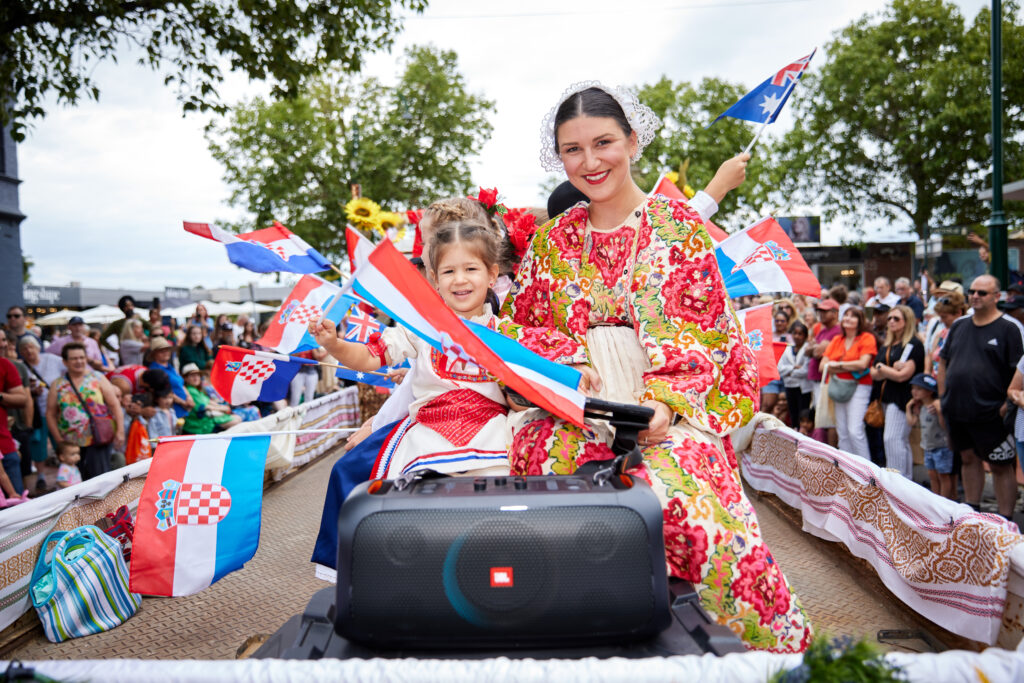
Croatian
The Croatian Community of Geelong is one of the region’s biggest ethnic communities, with over 5,000 residents calling themselves Croatian. The Croatians began migrating to Australia after WW2 and have since established 3 community halls, ‘The Dom’ Australian Croatian National Hall. 101-111 Seperation Street, Bell Park, the Croatian Community Centre. Cnr Cox and Matthews Rd, Corio and North Geelong Warriors Soccer Club. Gibbons Rd, Lara.
In 1972, the Croatian Cultural Artistic Association, or ‘LADO’ was established in Geelong, and it has played an integral role in showcasing and promoting Croatia’s rich, proud culture and heritage through music, song and dance. In 2017 LADO celebrates their 45th anniversary of service to Geelong. LADO consists of over 100 active dancers and 30 musicians and continues to strengthen with the support of over 100 volunteers.

Dutch
The Dutch population in Geelong comprises of 1400 people. In the early 1950’s they established the Geelong Dutch Club, which has since grown to 10 active Dutch clubs servicing the Geelong Region, they are:
- Swallows Karnival Club
- The Rocket Club
- Micare/ Dutchcare
- 50 plus Club
- Dutch Women’s Club
- Corio Card Club
- Geelong Card Club
- Dutch Choir: The Oranje Singers
- Dutch Carpet Bowls
- Geelong Dutch Clubs Inc
Contact: Geelong Dutch Clubs Inc. President – Tony van der hoeven
Email: [email protected]
Vice President – Jim Hoekstra
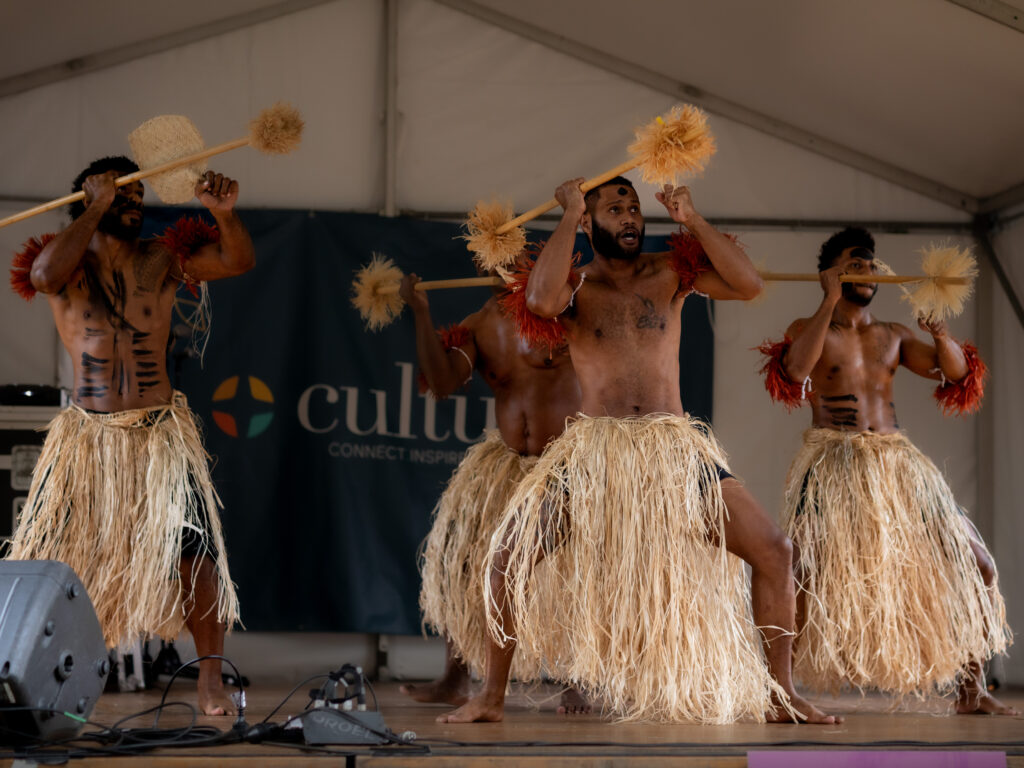
Fijian
The club commenced in 1985 by the Late Pastor Peceli Ratawa and his wife Wendy Ratawa. A Fijian Choir, comprising of 88 members, from Labasa, Fiji (a little town where Peceli Ratawa came from) visited Geelong and Melbourne to promote the Pacific cultures in the Australian community. Fijians in Geelong got together to organise concerts, church services and host the group.
Since this time, the club has participated in Pako Festa, Geelong and we’ve been affiliated with the Geelong Ethnic Communities Council trading as Diversitat for 25 years.
The Fiji Geelong Friendship Group assists with immigration issues, provides accommodation for visitors on medical visas, contacts students at Deakin University, Geelong from Fiji, demonstrates arts and crafts and networks with the Fijian families and friends of Fiji in the Geelong region.
Our club promotes unity among all Australian Fijians living in Geelong irrespective of their gender, age, religion or ethnic origin.We assist in helping them achieve their full human potential, promote harmony and social cohesion and earn a reputation as a welcoming and caring community within our multicultural society.
Fijians are proud of their culture and tradition which exemplifies mutual respect and harmony. Our club is committed to reconnecting Fijians with their culture, tradition and values and establish contacts with other ethnic groups within the Australian community at large.
The club’s vision is to transform the Fijian Community in Geelong by inspiring them to open their minds, accept differences in the community, achieve their full human potential and earn a reputation as a welcoming, caring, united and respectful community.
Our mission is to be the virtual centre for providing community support services that will enhance and empower the quality of life of all Fijian Australians living in Geelong through spiritual and holistic development, language and culture, education, social cohesion, sports, healthy living and income stability.
We value and respect our rich culture and are proud of our heritage that promotes respect, dignity and harmony. The community meets the spiritual, physical, mental and emotional needs of all individuals.
The Fijian culture is renowned for being warm and welcoming, so it’s no surprise that the islands are home to people of many different religions, from Christianity to Sikh. Fijians with Asian ancestry, such as Fijian Indians, tend toward Islam, Hinduism, and Sikh, whereas many indigenous Fijians identify as Christians.
You may have heard of some of the cultural stables:
- Fijian Kava
- Palm weaving
- Coconut husking in Fiji
- Food wrapped in palm fronds in preparation for the Lovo
- A traditional Meke performance
Traditional food in Fiji Rice, sweet potatoes, taro (a tropical root vegetable), coconuts, cassava (a starchy shrub), breadfruit, and of course, fish, have made up the majority of the Fijian diet for centuries.
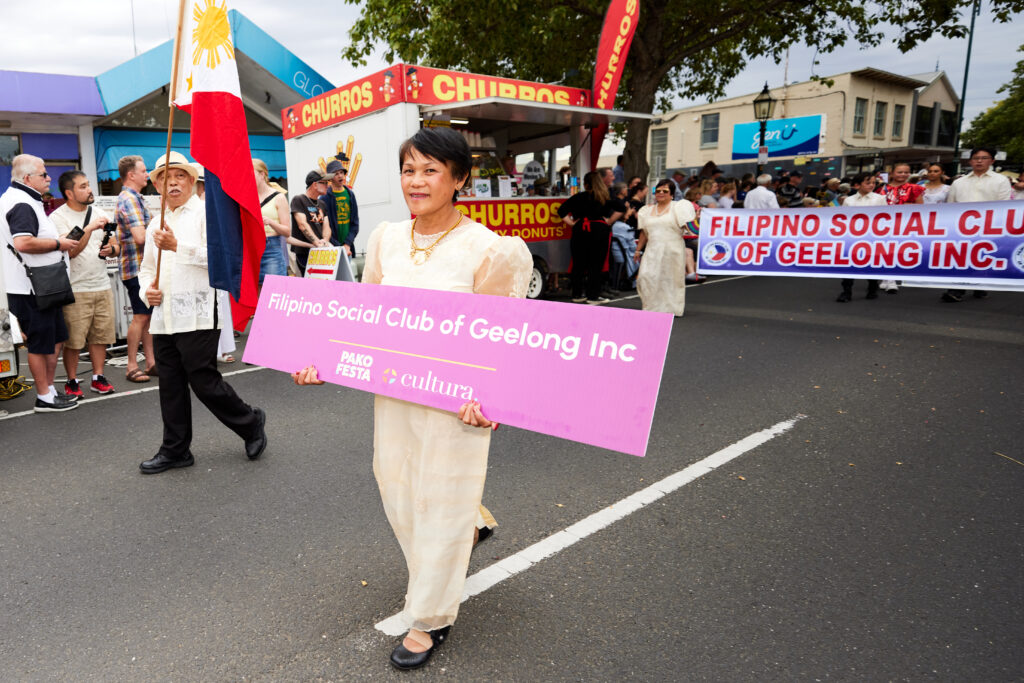
Filipino
The Filipino Australian Friendship Association of Geelong Inc (FAFAG) is a non-profit incorporated organisation established by a group of migrant families in Geelong in 1981. FAFAG manages its own Clubhouse where the Committee and Members deliver community events, special projects, cultural celebrations, social programs and weekly Multicultural Seniors Planned Activity Groups (PAG), funded by the Federal government.
Filipino Social Club in Geelong:The club also helping people in Philippines suffered from calamities
Traditions link the past, present and the future for Filipino people. Here are some important customs:
- Mano po- as a sign of respect for elders, children are taught “mano po,” where they take the hand of an elder and bring it to their forehead as a sign of respect.
- Bayanihan spirit– a custom that emphasizes community cooperation, usually the neighbours coming together to help a local with house construction or moving.
- Fiestas –held in honour of patron saints and are marked by vibrant festivities, feasting, processions, sports, beauty pageant and various cultural activities.
- Pasko (Christmas) – marked by Parol-making (star lantern, house carolling and Simbang Gabi (nine days dawn masses) until Christmas Eve mass followed by Noche Buena (Good night meal), the grand feast shared by families on the night of December 24th.
- Pabasa- which translates to “reading” or “singing,” is a devotional practice where the Pasyon (Passion of Christ) is chanted by groups in communal setting during Easter.
- Penitensya- acts of penance performed as a form of spiritual discipline during Holy Week. This may include self-flagellation, walking barefoot while carrying a cross, or even crucifixion. These acts symbolize the suffering and sacrifice of Jesus Christ.
- Altar- households have a designated area or altar at home where religious statues are displayed for family prayers, rosary novenas and other devotions
- Filipino Balikbayan Boxes and Pasalubong – Filipinos always bring a pasalubong (gift on arrival) for friends and family on returning home from a trip. Balikbayan (Return home) boxes are typically filled with goods and gifts sent by overseas Filipinos to their families back home.
Family activities centre around the kitchen. Meals are informal and dishes are served all at once and not in courses. There are three main meals of the day, with Merienda (snacks) in between. The traditional way of eating is with the hands or with a fork and spoon.
Filipino cuisine is a melting pot of Indo-Malay, Chinese, Spanish and American influences. Rice is the staple food across the country. Meat staples are chicken, pork, beef and fish. Adobo (meat stew) is considered the national dish, but equally popular are mechado, kaldereta and afritada, Spanish influenced meat tomato sauce-based dishes, and fried chicken.
Also popular are pansit (noodles), ispageti (pasta spaghetti), bistek (thinly sliced marinated beef steak), kare kare (peanut stew with oxtail), dinuguan (pig’s blood), sinangag (fried rice), pinangat (laing taro leaves coked in coconut milk), champorado (chocolate rice porridge), Paksiw na isda (vinegar-based fish stew), sinigang (soup), Crispy pata (crispy pork knuckles), pinakbet (vegetable stew with fish paste), lechon (roast suckling pig). There are also regional variations in the cured meats such as pork tocino and logganisa (sausages).
Breads, cakes, sweets and pastries– popular are pandesal, ensaymada, empanada, egg pie, buko pie (coconut), bibingka, cassava cake, turon (banana fritters), mais con hielo (sweet corn with crushed ice and condensed milk), puto, leche flan, ube halaya and of course halo-halo (shaved ice with sweets and milk).
Filipino Australian Friendship Association of Geelong:
Website: www.fafag.au
FB: Filipino Australian Friendship Association of Geelong
Email: [email protected]
Mobile: +61 412 598 581
Filipino Social Club:
Email: [email protected]
Mobile: 0404703440
Please visit FAFAG website: www.fafag.au for details as events get finalised:
- Ube Fest @ Pako Festa- 24 Feb 2024
- Young Professionals Forum- March’24, Date TBA
- Philippine Independence Day- June’24 Date TBA
- Winter Dinner Dance- July ’24 Date TBA
- FAFAG 43rd Anniversary Dance- Sept’24 Date TBA
- Pasko sa Geelong ’24- December’24 Date TBA
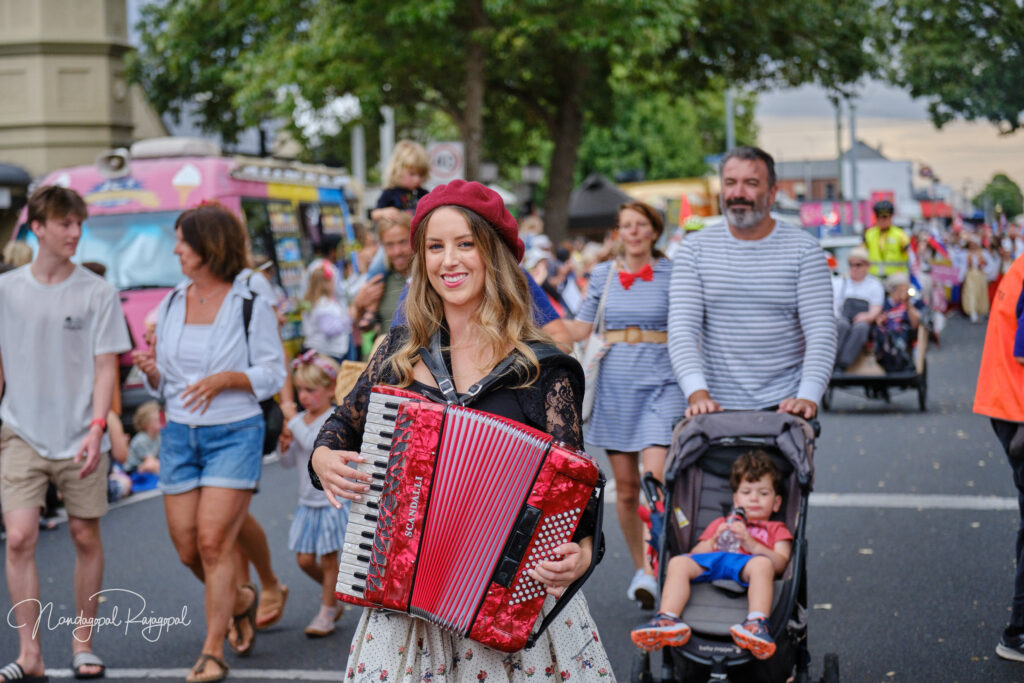
French
The Alliance Française de Geelong was established in 2002 and has been an affiliated member of Cultura since that time. It has approximately 200 members. It offers a series of cultural events each year, including the Bastille Day dinner, a crepe lunch for La Chandeleur and the Beaujolais Long Lunch. In 2022 it held its inaugural annual Le Festival Français at The Heights, Newtown in conjunction with the National Trust of Australia (Victoria). The Alliance Française de Geelong also offers French classes, from beginners to advanced, to over 70 adults each year and provides fortnightly conversation classes to local VCE French students.
Many French traditions centre around food and Sunday lunch still consists of multiple courses and lasts several hours in many families. A predominately Catholic country, many traditions celebrate events in the Christian calendar, such as the Epiphany, Easter and Christmas.
Famous for its baguettes and croissants for breakfast, French cuisine is also known for its array of pâtisseries, including the éclair, tarte aux pommes and pain au chocolat. Bœuf bourgignon, coq au vin, bouillabaisse and ratatouille are just some of the French dishes that are enjoyed around the world.
Le Festival Français
Beaujolais Long Lunch
(see the website for more details)

German
The German Karneval Society was established in 1955 and today have approximately 200 members. They meet on a regular basis at their Community Hall on Arunga Ave, Norlane.
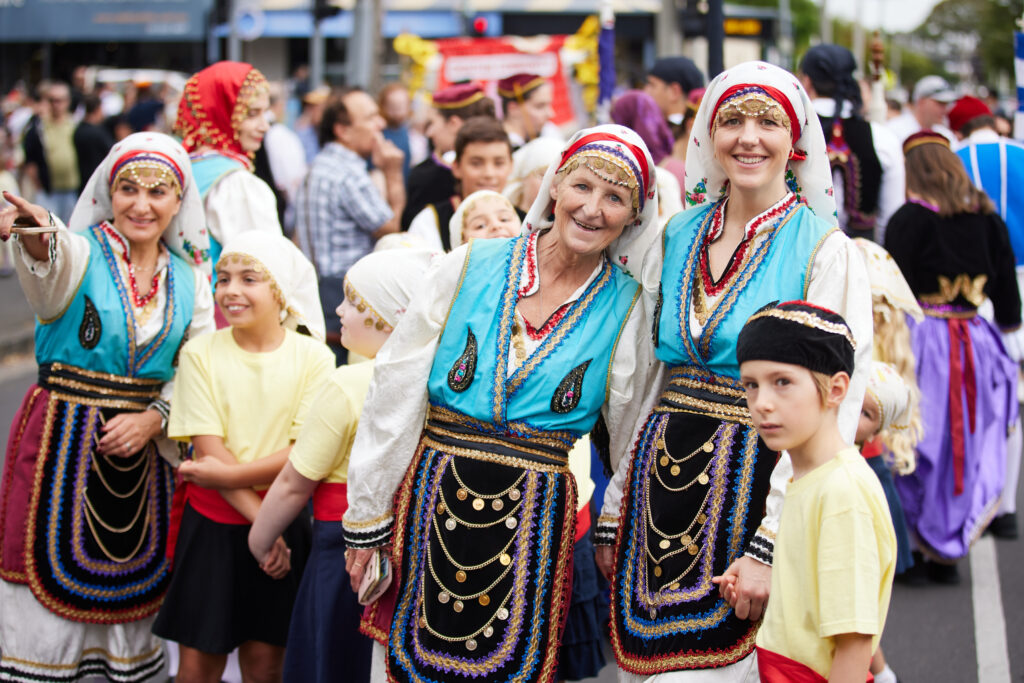
Greek
The Geelong Greek Orthodox Community was formed in 1956 by Greek migrants arriving in Geelong. Today there are approximately 3,500 Greeks in Geelong who have migrated from various regions of the country, including Crete and Cyprus.
The Hellenic Community has a Greek Orthodox Church and Community Hall in Hamlyn Heights, from where they host senior citizen groups, fundraising and many other community and cultural events.
The Greek Community School of Geelong was formed for students to learn the Greek language, Greek culture and traditional dance. Three age groups of children perform traditional dances, originating from various regions of Greece, in colourful national costumes that represent the regional dance origins. The school also hosts a Playgroup.
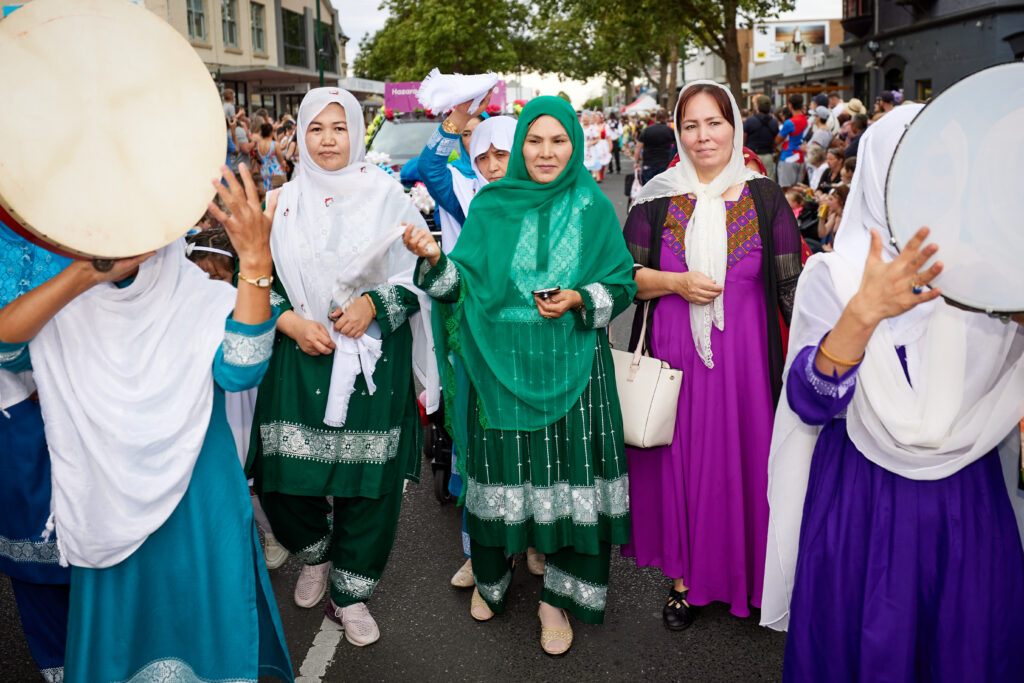
Hazara
The Hazara Community Geelong was established in 2013. The community has been participating in most Pako Festa events and other multicultural programs ever since.
Hazara culture is distinguished by its unique blend of Persian, Mongolian, and Central Asian influences, evident in their traditional music such as the melodies of the dambura and tabla, intricate embroidery on their clothing, and the enduring practice of communal gatherings known as “mehman nawazi,” where hospitality and kinship are celebrated through shared meals and storytelling.
Hazara traditional cuisine features hearty dishes like “Ashak” (filled dumplings served with yogurt and meat sauce), kebabs, and “Qabuli Pulao,” a flavourful rice dish with lamb, caramelised carrots, and raisins.
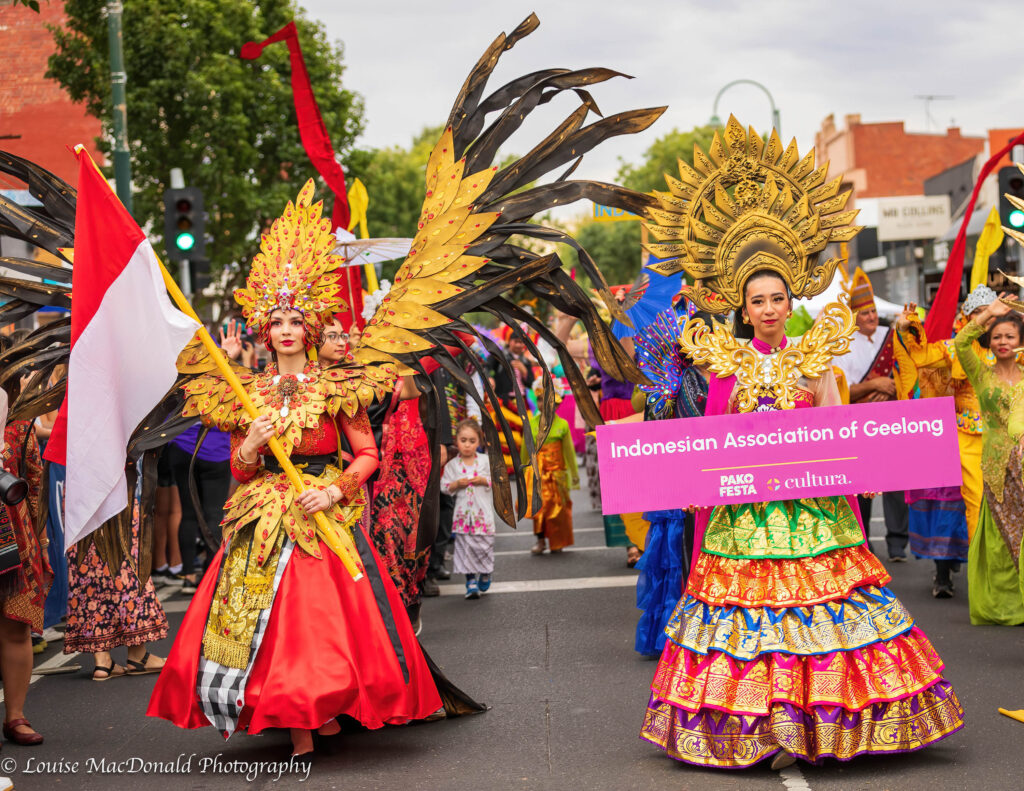
Indonesian
The Indonesian community has been affiliated with the Geelong Ethnic Communities Council for 27 years. Its committee is formed as the Indonesian Association of Geelong consisting of 19 members. The responsibilities include providing support to the community through sharing relevant important information, resources and organising events. There is also a broadcast of Indonesian Radio program on 94.7 The Pulse our very own Geelong Community Radio station.
Wayang or Shadow Puppet is a popular traditional art in Java & Bali and considered as an effective medium to spread the teaching of ethics and good social norms for the people. Wayang performances usually play an episode of the “Ramayana” or “Bharata Yudha” epic stories depicting the fight between good & evil where the force of good always prevails.
Batik – the famous traditional textiles of Java
Batik – the art of making batik emerged from the keratons of Solo and Yogyakarta. To wear batik was a prerogative of the royal families. Batik was produced in the “puris”. Several patterns like parang rusak, kawung as well as the kain dodot were reserved for the royal family. Today everyone can wear batik and many beautiful batik styles evolved along the north coast of Java from Indramayu to Semarang.

Iranian
The Geelong Iranian Society (G.I.S) is a non-profit, non-political and non-religious organisation, established in 2007 to promote better communication amongst thousands of Iranian migrants and the local community.
Their focus is to provide welfare, social services and support to the Iranian community, to promote social, recreational and sporting activities and to promote Persian culture, music, literature and arts.
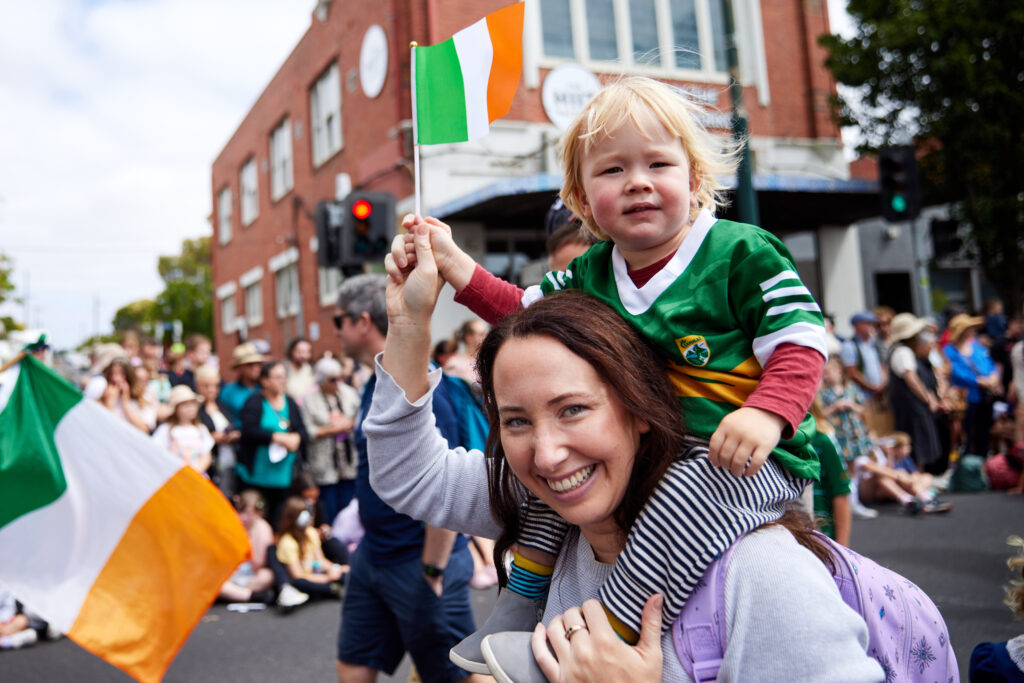
Irish
The Geelong Irish Society was formed over 50 years ago and now has well over 100 families within its community.
The aim of the community is to promote and encourage Irish National and Cultural Heritage, and to enhance through social interactions Irish – Australian relationships. The Irish Community have a show on 94.7 The Pulse every Friday between 6-7 pm, with Irish music, news and information.
Throughout the year the community enjoys many events, including regular family days/evenings, dances, bus trips, trivia nights, BBQ’s, fundraisers and music concerts, supporting the Geelong Gael’s Gaelic Football team. Some community members visit nursing homes and hold small concerts, in addition to helping out other communities and charities.
Regular annual events include:
- February – participation in Pako Fest street parade and food stall
- March – St Patrick’s Day Party/ ball
- October – Halloween celebrations
- December – Christmas lunch
Find out more:
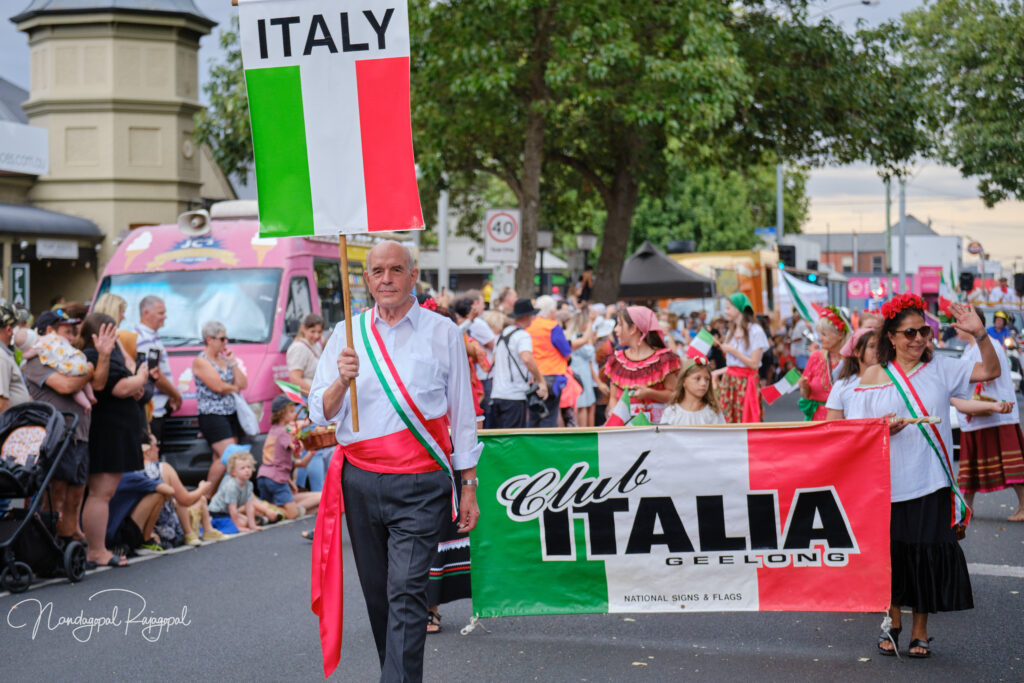
Italian
Club Italia boasts a fully functioning centre, providing meals and various functions for the public and private functions. Everyone is welcome at Club Italia.
Pasquetta Family Day.
Salami and sauce making.
Lasagne, pizza, pasta, cannoli, arancini, sauces, biscotti
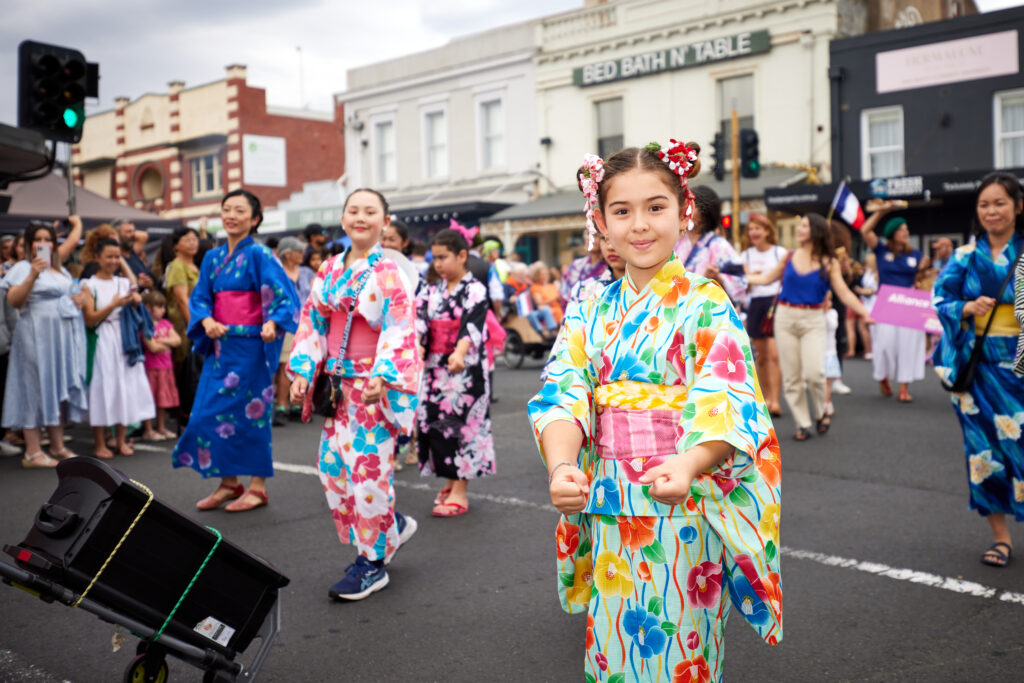
Japanese
Japanese Association of Geelong’s principle is to strengthen a friendship among Japanese residents in Geelong and develop a positive relationship of Japanese and Australian communities in Geelong and beyond, promoting positive cultural exchange and goodwill between communities. One of its strengths is that the organisation provides great opportunities for people to ‘shine together’, welcoming anyone who supports its principles. JAG has been playing a significant role as the only contact point in this region for those who seek information about Japanese related-events, programs, and organisations since the establishment.
Japanese culture is a set of values that puts importance on social harmony and hard work. Japanese people always display modesty and humility. People often bow to convey the message: “I am not above you. I respect you.” Bowing longer with a higher degree of angle means more respect. Additionally, Japanese people have two religions at the same time, both Buddhist and Shintoist. When a Japanese baby is born, the ceremony is held in the Shinto shrine and when someone dies the ceremony takes place in a Buddhist temple. people are obsessed with hygiene, we take off their shoes when entering someone’s house and take a bath almost everyday. there is a major cultural celebration almost every month. Japanese people like celebrating seasonal changes to show their appreciation of new beginnings. The three most important celebrations in Japan are:
- The new year’s day. Japanese people visit a shrine after the midnight on Dec 31 to make a wish.
- Cherry blossom celebrations in April. It is a custom to have a picnic under the cherry trees.
- The Obon Holiday in August. Japanese people visit their hometown to commemorate the spirits of those who passed away.
Japanese traditional cuisine is a unique and intricate culinary tradition that reflects the country’s rich cultural heritage. It is deeply influenced by the principles of balance, simplicity, and seasonality.
One of the key characteristics of Japanese traditional cuisine is the emphasis on fresh, high-quality ingredients. The Japanese believe that the natural flavors of the ingredients should shine through, so they are prepared and presented in a way that preserves their taste and textures. This often involves minimal seasonings and cooking techniques that enhance the natural flavors rather than overpowering them.
A notable aspect of Japanese traditional cuisine is the focus on the presentation of the dish. Japanese chefs pay great attention to the aesthetic appeal of the food, considering color, arrangement, and balance. Traditional Japanese dishes are often served in carefully crafted and beautiful ceramic or lacquerware, adding to the overall dining experience.
Another important element of Japanese traditional cuisine is the concept of ichiju-sansai, which means “one soup, three dishes.” A typical meal often consists of a bowl of soup (miso soup being the most common), accompanied by three side dishes. These side dishes can include grilled fish, simmered vegetables, tempura, sashimi, pickles, or steamed rice. The combination of these elements aims to provide a well-rounded and nutritious meal.
Seasonality plays a crucial role in Japanese cuisine. The usage of fresh, seasonal ingredients is highly valued, as it allows people to enjoy the flavors at their peak. Different regions in Japan have their own unique local ingredients and specialties, bringing diversity to the traditional cuisine.
In addition to the main dishes, Japanese cuisine also features various condiments such as soy sauce, miso paste, and wasabi, which are used to complement and enhance the flavors of the food. It is not uncommon for each diner to have their own small dish of soy sauce or pickles to personalize their dining experience.
Japanese traditional cuisine is renowned for its simplicity, harmony, and attention to detail. It offers a delicate and balanced approach to food, reflecting the beauty of Japanese culture and nature.
Community holds a Wadaiko (Japanese Drum) lesson every month.
To learn more, please contact [email protected]
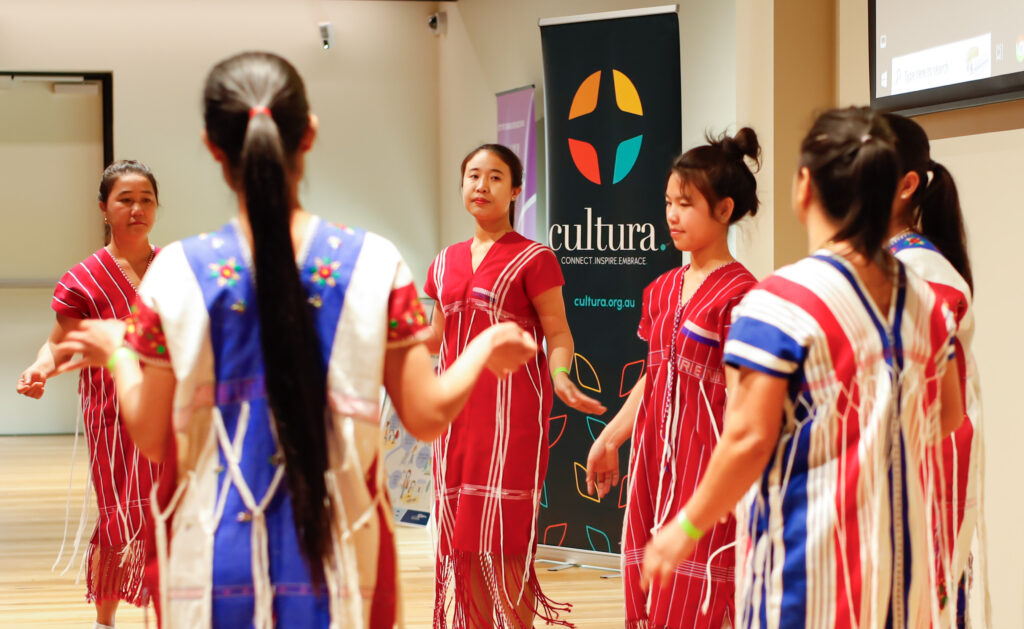
Karenni
The Karenni come from a territory between the East of Myanmar and the North-west of Thailand, and include four main tribes, the Kayah, Kayan, Kayaw and Paku.
Due to political conflict in Burma, the Karenni fled to Thailand and as a result of a resettlement program commenced in 2005, there are now approximately 200 Karenni in Geelong. Most of the adults are employed on farms in the Geelong region.
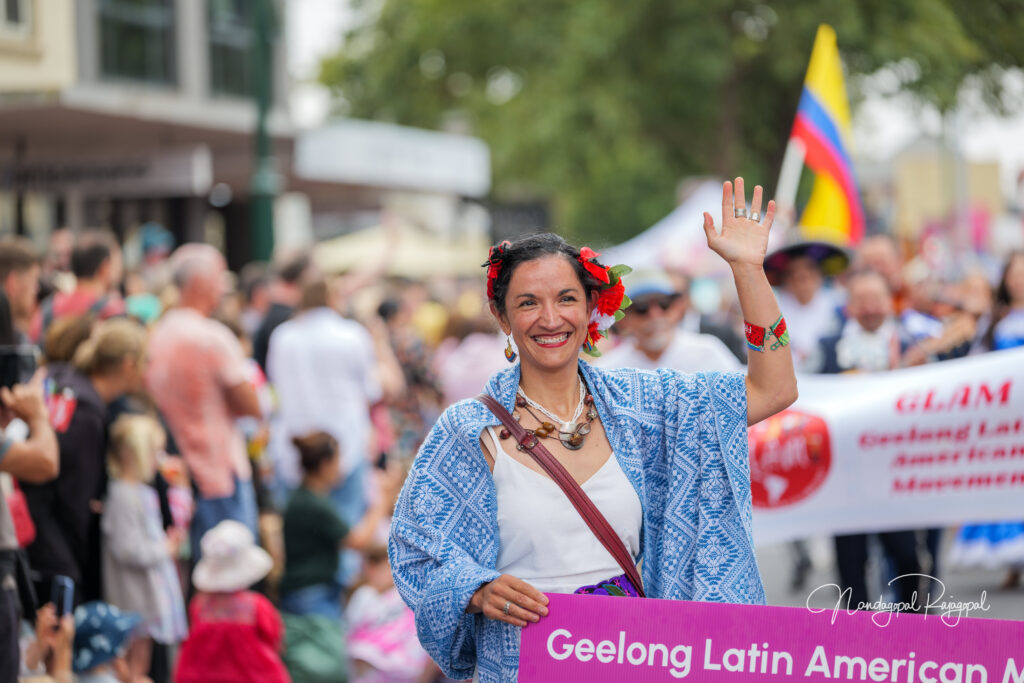
Latin American
GLAM was establishes as a fusion of the old and young generations of Latin American people living in the Greater Geelong and surrounding area united by culture and traditions, working together to keep and share values among all other Communities in the area.
After colonisation, ancient Indigenous traditions blended with Spanish customs and religion, resulting in a rich variety of influences in music, agriculture, food, and most notably, the emergence of a new culture. This new culture is famous for its festivals, which are a fusion of ancient Indigenous traditions and religious rites.
All celebrations are full of colour, music, and dance. Some of the main festivals still celebrated are:
- Carnival (Brazil)
- Inti Raymi (Peru)
- Day of the Dead (Mexico)
- Flower Fair (Colombia)
- Grape Harvest Festival (Argentina)
- La Mama Negra (Ecuador)
- August Festival (El Salvador)
- All Saints Day ( Guatemala)
- Lempira Festival (Honduras)
- La Purisima (Nicaragua)
- Lobsterfest (Belize)
- Fiesta de Palmares (Costa Rica)
- Carnaval (Panama)
- The Mapuche We Tripantu Celebration (Chile)
- San Blas Day Festival (Paraguay)
- Carnival’s Inaugural parade (Uruguay)
- Urkupina Festival (Bolivia)
- Festival del Caribe (Cuba)
- Choukoun-Carnival (Haiti)
- New Year Day Carnival(Venezuela)
A well-developed agriculture was already in place before colonisation with Maize or corn being the main staple food.
Still very popular in the whole of Latin America, Corn is used as a main ingredient to make different meals and desserts.
From Mexican tacos, burritos, and tortillas to El Salvador’s pupusas and tamales, and South American arepas and humitas, maize is a fundamental ingredient in many culinary creations.
Today, Latin American cuisine represents a fusion of ancient traditional foods with modern ingredients. It is internationally renowned for its rich flavors and exquisite dishes, earning prestigious awards such as the Michelin Award and others.
E-mail: [email protected]
Hola Geelong ! – Every first Saturday of the month.
Zumba from August 2024 onwards.
GEELONG LATIN AMERICAN WOMEN GROUP
GLAM FAMILY DAY (08/09/2024)
Children Week Celebration – GLAM MAMITAS (26/10/2024)
Dia de los Muertos (Day of the Dead) (03/11/2024)
Pastorelas – December 2024 (TBA)
Meet the Chef – January 2025 (TBA)
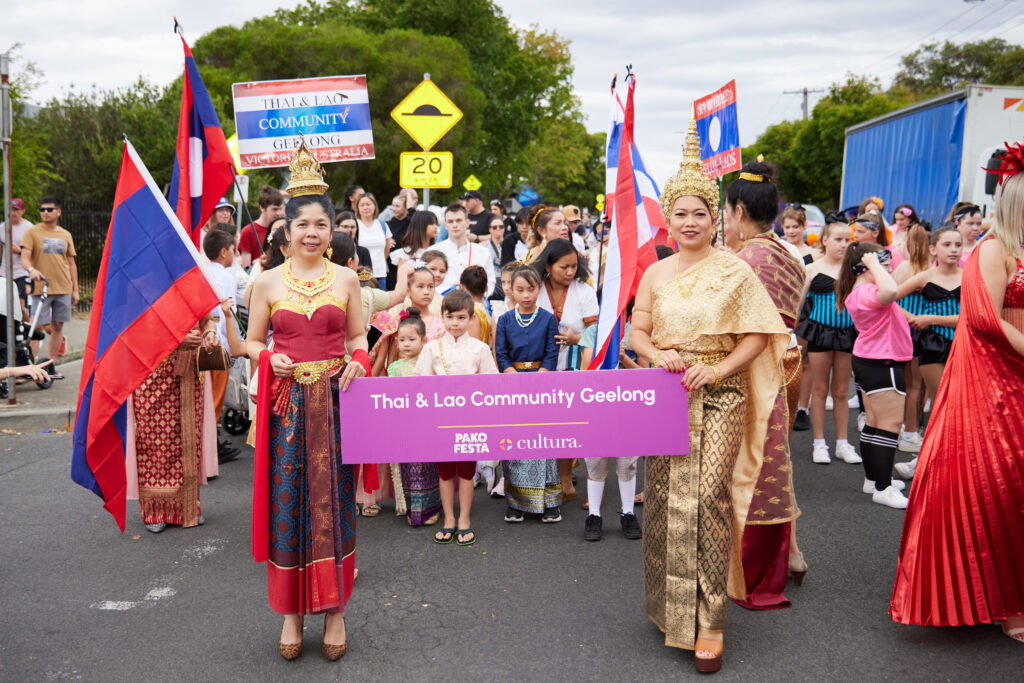
Lao Thai
The Lao-Thai Geelong Care Inc was formed in July 2016, representing approximately 400 Lao and Thai people in the Greater Geelong Region.
As a new committee, their current activities include a community garden and promoting spiritual wellbeing, which is developed through inter-faiths dialogue. Future goals are to provide support and cultivate a sense of belonging and inclusiveness for the Lao-Thai community in the region.
- Contact: President Davorn Jones
- Lao Thai Facebook Page
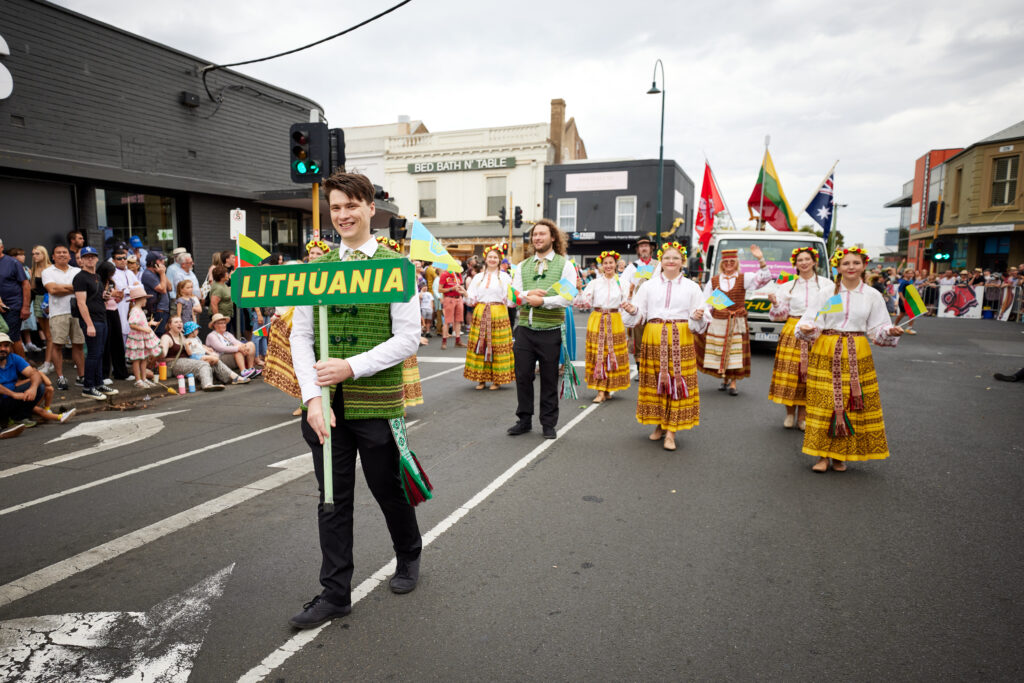
Lithuanian
Geelong’s Lithuanian Community formed from the post World War II wave of migration to this region. We have fourth generations from these first arrivals currently taking part in our organisations! Based at Pettitt Park Hall in Bell Post Hill, we are the last active Baltic community in Geelong and the only Lithuanian colony in a regional Australian city.
We are inclusive & welcome everyone into our organisation!
We have a mixed choir “Viltis” , folk dance ensembles : “Gegute” for children and “Linas” for student age upwards, a senior scouts division “Zidinys” and a billiard group. Our well known basketball club “Vytis-Knights” has a proud history in Geelong!
We are a small but proactive group and delight in sharing our rich, colourful culture with the wider Geelong community!
Annual highlights include our Lithuanian Independence celebrations and popular Mother’s Day Concert. Events are a great opportunity for our ladies to wear their precious national amber.
Some of Lithuanian favourite dishes include “kugelis” : potato bake and “cepelinai” : meat or cheese centred potato ovals in the shape of “zeppelins”! We even have a popular folk song and dance named after pancakes!
For more information go to “Lithuanians in Geelong” on Facebook: https://www.facebook.com/GeelongLithuanians?mibextid=LQQJ4d
Our hall is available for hire.
For bookings please contact :
Peter Obeliunas 0437 261 590
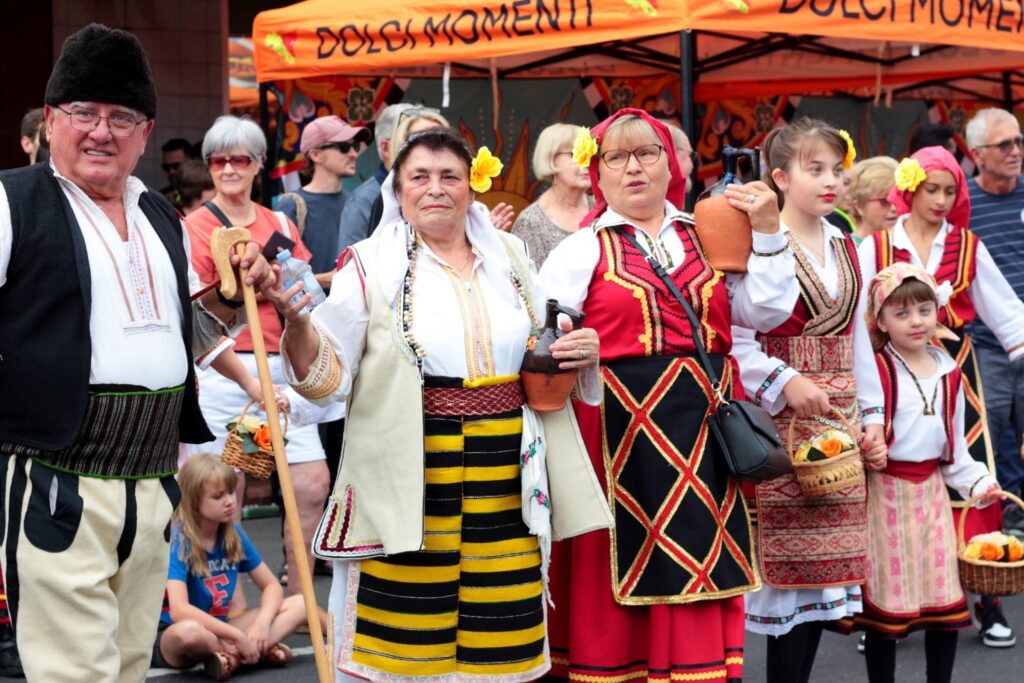
Macedonian
Macedonian Orthodox Community of Geelong includes:
- Macedonian Senior Citizens Group
- Biser Folk Dancing Group
- Vardar – Fishing Club
Macedonia has a rich cultural heritage in art, architecture, poetry and music. It has many ancient, protected religious sites.
Poetry, cinema, and music festivals are held annually. Macedonian music styles developed under the strong influence of Byzantine church music.
Macedonia has a significant number of preserved Byzantine fresco paintings, mainly from the period between the 11th and 16th centuries. There are several thousands of square metres of fresco painting preserved, the major part of which is in very good condition and represent masterworks of the Macedonian school of ecclesiastical painting.
Macedonia’s cuisine is representative of that of the Balkans—reflecting Mediterranean and Middle Eastern (Ottoman) influences, and to a lesser extent Italian, German and Eastern European (especially Hungarian) ones.
The relatively warm climate in Macedonia provides excellent growth conditions for a variety of vegetables, herbs and fruit. Thus, Macedonian cuisine is particularly diverse.
Macedonian cuisine is also noted for the diversity and quality of its dairy products, wines, and local alcoholic beverages, such as rakija. Tavče gravče and mastika are considered the national dish and drink of North Macedonia, respectively.
Some other important dishes include Šopska salad, an appetiser and side dish that accompanies the main meal, ajvar, stuffed peppers, pastrmajlija and others.
Email: [email protected]
Website: macedoniansingeelong.com.au
Facebook: Macedonian Community of Geelong Inc
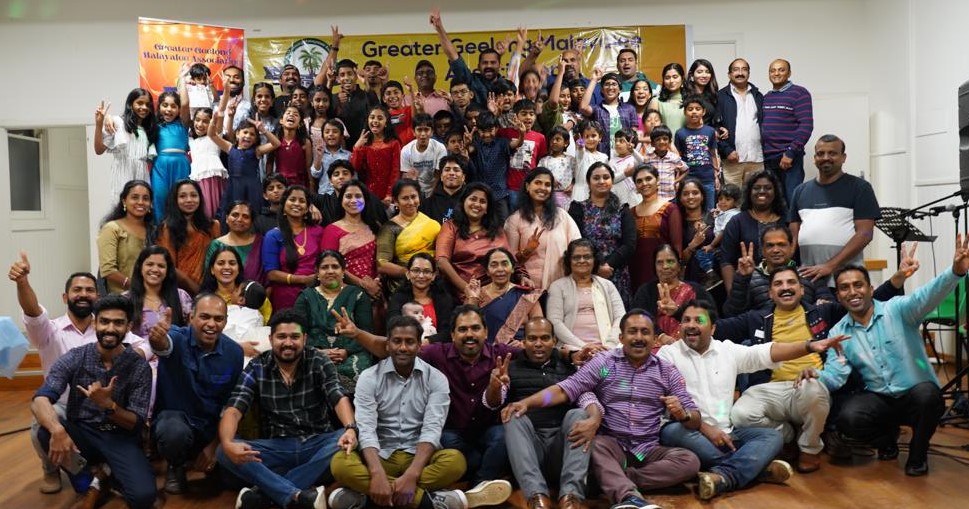
Malayalee
Greater Geelong Malayalee Association:
GGMA Inc. is affiliated to Consumer Affairs, Victoria.
Mission:
The mission of the association is to provide a very close and strong community feeling among the members and to foster and nurture both the sporting and cultural talent of each and every individual which preserves and strengthens our cultural background and to represent the Association with one voice when dealing with other Associations of the same background.
The purposes of the association are—
- Promote full participation of Malayalee’s in Geelong area in the social, cultural, economic and political life of Victoria.
- To integrate with local community, while maintaining cultural identity of Malayalee’s.
- Work with other likeminded Victorian Multicultural communities.
- Promote and contribute to the social, cultural and economic benefits of the Greater Geelong region
- Promote the welfare of all its members and support them at every stages of life.
Geelong Malayalee Association:
The organisation’s mission is to provide a platform for all the diaspora of Kerala to unite and support in order to uphold and facilitate the fascinating art and culture of the God’s own Country. We call it “Geelong Malayalee Association-GMA”.
The culture of Kerala is an amalgam of native art forms, language, literature, architectural style, music, festivals, cuisine, archaeological monuments, heritage centres and so on.
The artistic field of Kerala comprises ancient classical art, folk art as well as modern artistic forms.
The musical culture of Kerala includes folk music (folk songs, ritual songs, Thiruvathira songs, Vanchipattu) and classical music comprising Carnatic music, Kathakali music and Sopana music.
The traditional musical instruments of Kerala include among others Panchavadyam, Chendamelam, and Thayambaka.
The traditional dress of Kerala is called Mundu which is a white cotton sari and is famous both among men and women on special occasions. It is worn from the waist to the foot and resembles a long skirt or dhoti where the upper garment varies with gender.
The act of cooking a meal is called Pachakam in Malayalam. Coconut is the main food item used in cooking.
It is either chopped, grated or used as garnishing, coconut milk or paste is used to thicken gravies. While coconut oil is used for cooking.
Kerala is the “land of spices” hence you can’t think of food without spices. The main spices used in Kerala cuisine are black pepper, cardamom, clove, ginger, and cinamon.
Kerala has popular breakfast dishes like idli, dosa, appam, idiyappam, puttu, and pathiri. Rice and fish along with some vegetables are the staple diet in most Kerala households. Rice produced here has a unique shape and has more health benefits. Rice is the main starch ingredient used in food.
A typical meal in Kerala is a curry, a bhaji, curd, papad, and pickle accompanied with rice. Sadhya is a traditional Kerala dish that is an elaborate banquet prepared for festivals and ceremonies.
Popular Veg-food is Ariyal, Olan while non-veg food is shrimp coconut curry, fish poriyal. Seafood is popular and consumed with every meal “Karimeen” or fried fish is a popular dish and fish curry is called “Fish Moilee“.
Dessert includes unniappam, a list of payasams and pradhamans, and halwa. Among the beverage they have palm toddy (Kallu), chaaya (tea), nannari sharbath and herb waters chukku vellam, karingali vellam, etc.
Keralites have a special etiquette the food is eaten with bare hands, where your palm acts like the spoon where you make a small morsel of the food and slid it by your thumb into your mouth.
One of the traditional Kerala dishes is vegetarian and is called the Kerala sadya. A full-course sadya, consists of rice with about 20 different accompaniments and desserts, and is the ceremonial meal of Kerala eaten usually on celebratory occasions including weddings, Onam and Vishu. It is served on a plantain leaf.
Greater Geelong Malayalee Association:
Email: [email protected]
Website: https://ggma.org.au
Geelong Malayalee Association:
[email protected]
Facebook
Instagram

Maltese
Portarlington Maltese Pensioners Assoc
Initially created more than 25 years ago. Incoporated since 2000
Members: 129
Committee consists 7 members
Olive leaves or small branches are burned around the house to ward off evil that might enter.
Each village has a patron saint. The saint’s feast day is celebrated with a festa that lasts 4 days. The fireworks are hand made by the villagers and are quite spectacular.
Traditional Maltese food is rustic and based on the seasons.
Maltese food reflects Maltese history.
Strong influences are Italian as well as Spanish French, Arabic and British.
Email address [email protected]
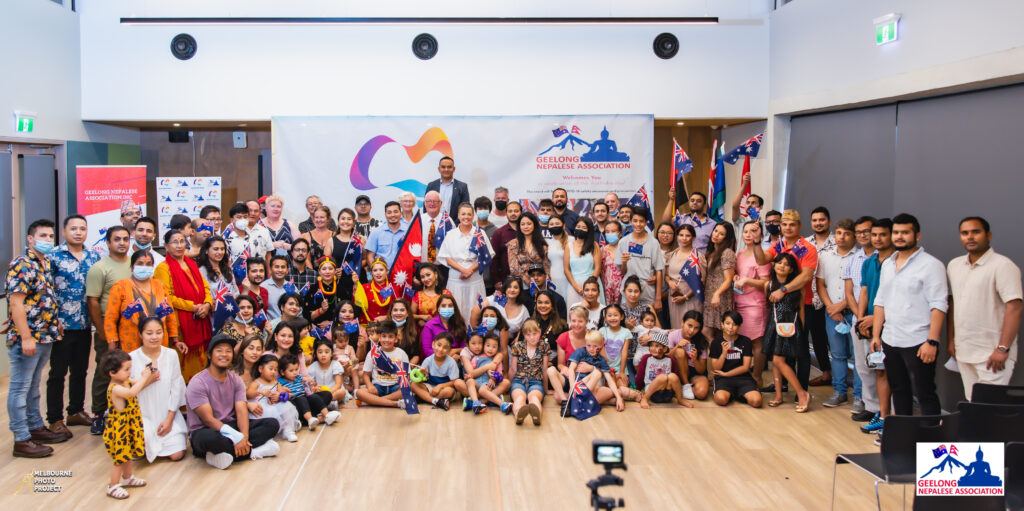
Nepalese
Geelong Nepalese Association (GNA) is a not-for-profit organisation established in 2012 to preserve and promote Nepalese culture and diversity. GNA is registered with the Consumer Affairs of Victoria and affiliated with the Geelong Ethnic Community Council (GECC). The organisation has 15 executive board members, 90 registered members, 350 general members and more than 1500 well-wishers living in Barwon South West Region.
GNA’s mission is to foster a “Happy and Healthy Community” while preserving and promoting Nepalese culture and traditions. We endeavour to uplift the Nepalese community in all aspects, assisting newcomers in areas such as job hunting, education, settlement, and placement. Our strategic focus emphasizes local, bottom-up planning, partnerships and collaboration, transparency, and sustainable approaches.
Geelong Nepalese Association has been working to equip community members (men/women/children) with the knowledge and skills to maintain their own good mental health and wellbeing and recognise symptoms in people close to them in order to prevent the development of mental health conditions.
Geelong Nepalese Association, with a proven track record of successful initiatives, has consistently been committed to our community’s wellbeing. Last year, our comprehensive COVID-19 program, funded by the Department of Health, positively impacted our community.
Our Purpose:
- To promote, celebrate and preserve Nepalese culture, traditions, language, costumes of Nepal and overall Nepali pride in the Barwon South West Region.
- To show Nepalese cultural diversity and solidarity through the Geelong Ethnic Community Council.
- To support Nepalese people living in Geelong and Surf Coast region in crisis.
- Work closely with other Australian communities and agencies to promote Nepalese culture and share multiculturalism with all.
- Coordinate and facilitate festivals among Nepalese and other communities in Geelong and Surf Coast.
Our Programs are continuously funded by:
- Victorian Multicultural Commission (VMC)
- Greater Geelong City Council.
- Department of Family Fairness and Health (Victorian Government).
- National Australia Day City Council (NADC)
- Geelong Connected Community
- Sport Victoria.
- And other supporters
Nepal has a population of over 27 million people and has many different ethnic groups that coexist in peace and harmony. There are 126 castes and ethnic groups speaking 123 languages throughout Nepal, and each community has their own customs and traditions that differ from one part to another.
The Nepalese staples consist primarily of rice, wheat, corn, lentils, and fresh vegetables and meats. A typical Nepalese everyday meal can be characterised by Dal (lentil soup), Bhat (steamed rice), and Tarkari (vegetable dish).
Another popular Nepalese food item, Gundruk is regarded as the national dish of Nepal. It is an assortment of pickled green-leafy vegetables which is relished as a condiment or a side dish with the main course meal.
Likewise, Momo (dumplings) is one of Nepal’s most popular dishes which can be eaten as an entree or as mains.
Teej- September 2023
A Hindu festival of womanhood day reflects on the occasion when Parbati, the daughter of Himalaya, won the hand of Lord Shiva after long meditation and fasting. Dancing, flock song, and the colour red dominate the day of Teej.
Dashain- October 2023
This festival is also known as “Bijaya Dashami” which is celebrated in Nepal in October and lasts for 10 days. This festival is one of the grandest, longest and most auspicious, celebrated by the whole country for the goddess Durga’s victory of justice over evil or demons. Dashain holds as an extremely significate festival that also emphasized the importance of family reunions which is helpful to ease social contradictions.
Tihar (Deepawali)- November 2023
This day is called “Brothers day” where sisters will honour their brother and pray to Yama, the god of death, for their brother’s prosperity, progress and longevity. This festival is a time of fancy sweets, gifts and juicy fruits.
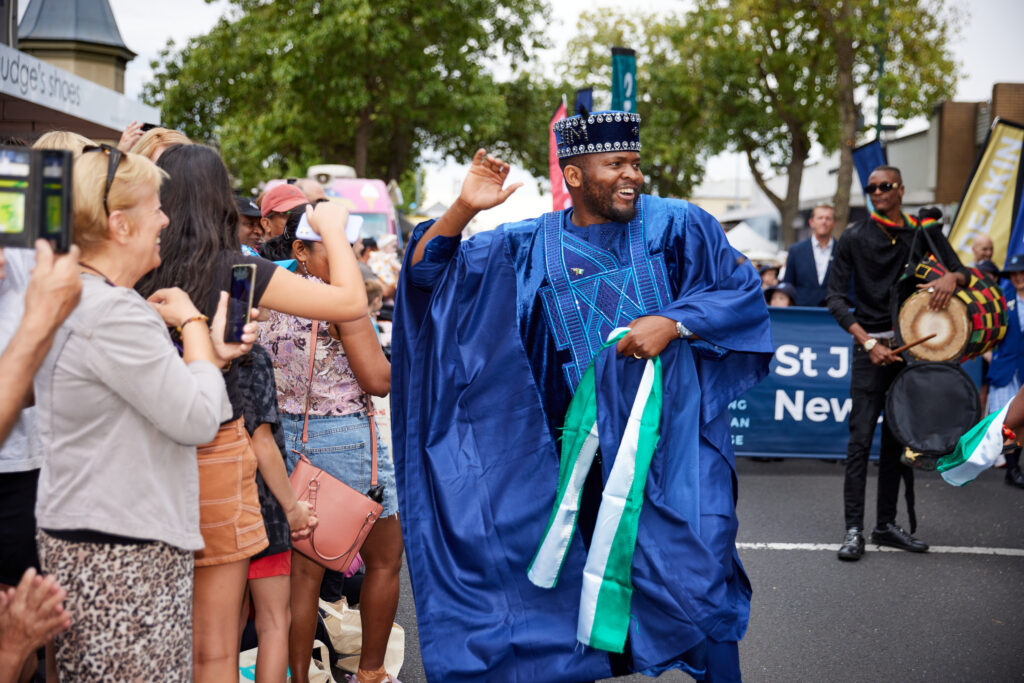
Nigerian
The Nigerian Association of Geelong Inc actively contributes to Geelong’s multiculturalism by celebrating community, cultural exchange, and networking among Nigerians living in the region. Through events and initiatives, the association embraces and shares the rich cultural heritage of Nigeria within the vibrant Geelong community.
Nigeria, a mosaic of cultures, is adorned with customs and traditions that define its diverse heritage. From the horse parades of the Hausa to the yam festivals of the Igbo and the vibrant ceremonies of the Yoruba, each ethnic group contributes to the diversity of Nigerian culture. Whether celebrating harvest, family bonds, or rites of passage, these customs form an essential thread connecting the past to the dynamic present, reflecting the resilience and unity of the Nigerian people.
Hausa: The Hausa people, predominantly found in the northern regions, have deeply rooted customs such as the Durbar Festival, a grand display of horsemanship, music, and colorful attire. Traditional Hausa weddings are marked by symbolic rituals and vibrant celebrations, emphasizing community and family bonds.
Igbo: In Igbo culture, the New Yam Festival (Iri Ji Ohuru) is a significant tradition, celebrating the harvest with rituals, dances, and feasts. The Igbo initiation ceremony, “Iwa Ji,” marks the transition to adulthood, embodying cultural values and identity through symbolic practices.
Yoruba: Yoruba traditions feature the elaborate Egungun Festival, honoring ancestors with masked performances and rituals. Weddings among the Yoruba involve intricate ceremonies, including the exchange of kola nuts and prayers, showcasing the importance of spirituality in their customs.
Traditional cuisine is a vibrant expression of cultural heritage, with each ethnic group contributing distinct dishes. In the North, Hausa cuisine is characterised by dishes like Suya (grilled meat) and Fura da Nono (millet porridge). Igbo cuisine, prevalent in the Southeast, features delicacies such as Ofe Nsala (white soup) and Boli (roasted plantains). Yoruba cuisine, dominant in the Southwest, offers iconic dishes like Jollof rice and Efo Riro (spinach stew). Common elements include the use of bold spices, local herbs, and staple ingredients like cassava, yams, and various meats.
Facebook: https://www.facebook.com/profile.php?id=100069055690060
Email: [email protected]
Phone: 0422270415
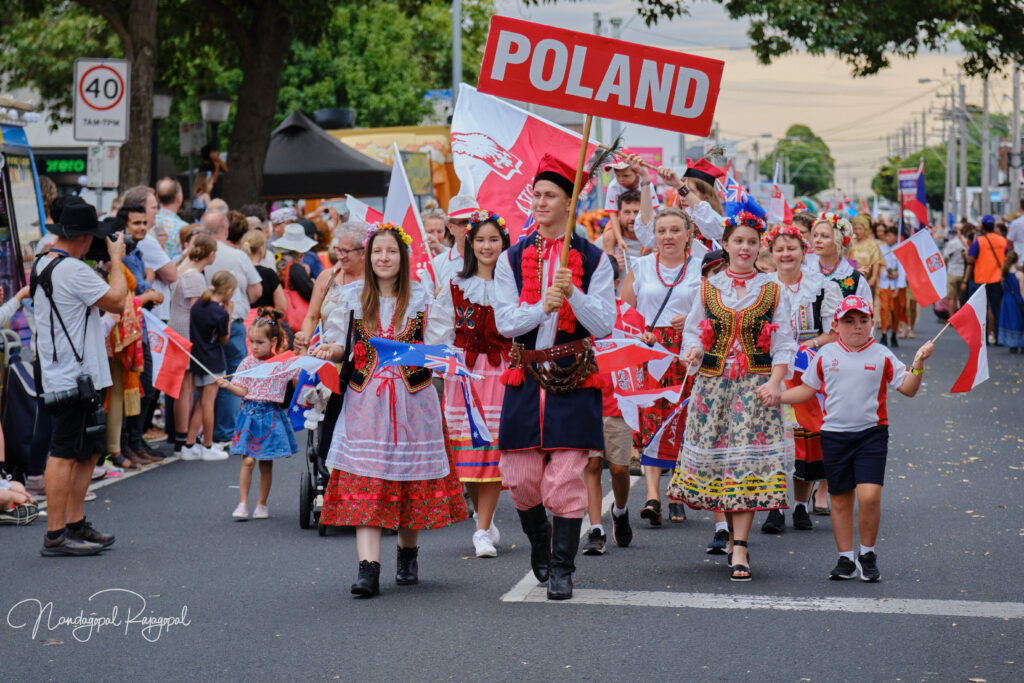
Polish
Membership of the Polish community in Geelong now numbers over 1,500 and their activities centre at the White Eagle House, located in Breakwater. Established in 1980, this venue now provides sporting facilities and activities, not just for the Polish Community, but for the wider community also. White Eagle House also operates a very popular restaurant and a successful pokies venue.
The community is also very much involved in promoting and maintaining the Polish culture within and outside its own community, through its Dance Group, Krakowiak, and by organising annual Polish concerts, traditional national celebrations and various sporting festivals. They also support the Saturday Polish School to keep their language alive.
Polish customs and traditions are deeply rooted in vibrant festivals, lively folk dances, and cherished rituals like Easter egg decorating and the blessing of Easter baskets, reflecting a strong sense of cultural pride and heritage.
Polish cuisine is known for its flavours and comforting dishes that reflect the country’s rich agricultural heritage and culinary traditions. Staples like pierogi (Polish dumplings), bigos (stew), and golabki (cabbage rolls stuffed with meat and rice) are beloved classics enjoyed by generations. Not any less famous is the smoky kielbasa (sausage) and barszcz (beet soup), served with sour cream. Polish cuisine celebrates simplicity, warmth, and abundance.
Contact: White Eagle House, Fellmongers Rd Breakwater
Website: www.whiteeaglehouse.com.au
E: [email protected]
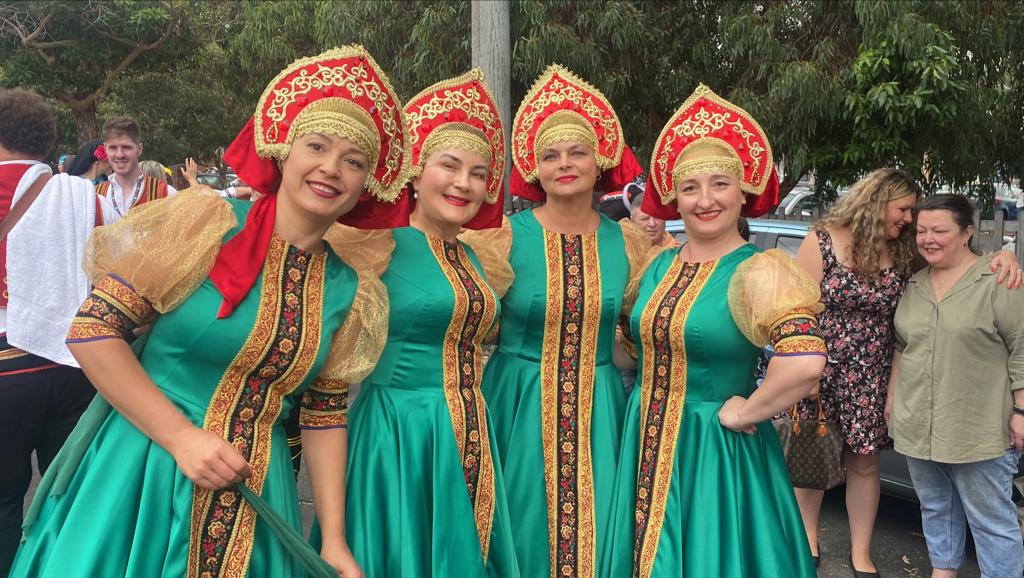
Russian
The Russian Orthodox Сommunity in Geelong began to form in the mid-twentieth century with the arrival of Russians ethnic from Euorope and China. The Orthodox church around which the life of our community revolves was built in the 1960s and now holds regular services on weekends and church holidays. In the community school children and young people learn the basics of the Orthodox faith and morals, and Russian language. Various celebrations related to religious holidays and Russian national traditions are held in the parish hall throughout the year.
The traditions of the Russian people are rooted in ancient times. Many are associated with Orthodox holidays: Easter, Christmastide, Christmas, Epiphany, Transfiguration, Procession of the Living Cross, Trinity, and Intercession of the Mother of God feast days.
The Russian people honour traditions that mix home comfort, generosity and cheerfulness. The soul of the Russian people is captured with these customs:
- Welcoming guests, who have come from afar, with homemade bread and salt;
- Steam room in a Russian bath with a plunge in an ice hole;
- Drinking tea over a samovar with bagels and pancakes;
- A hearty feast with dumplings;
- Folk entertainment – a bear dancing under the balalaika music.
Russian cuisine is one of the richest and most diverse culinary heritages in the world. The combination of diverse ingredients and cultural influences has created a unique culinary experience that continues to delight foodies around the world. Russian cuisine is famous for red and black caviar, pancakes, pies and kulebyaki, dumplings, fish soup and sour cream – all have become symbols of Russian hospitality. On the Russian table there is a wide variety of first courses: buckwheat, pickled and fermented garden vegetables and fresh homemade fruit jams, wild game sausages and wild mushroom dishes.
The Russian stove is a large oven that heats the whole home, its primary role is for home bread baking, and preparation of stewed, simmered, baked and boiled dishes.
Russian cuisine does not only consist of hearty and flavourful dishes, but also is considered a national treasure. It continues to surprise and delight with its diversity and taste discoveries, remaining an important part of the cultural heritage of Russia. By preparing traditional recipes and enjoying the taste of the dishes, we feel a connection with our ancestors.
The whole life of a Russian person is accompanied by the influence of ancient traditions; this is embedded in us along with our upbringing, the Russian spirit. Due to the love for our native country and respect for the rich past, these customs are still with us.
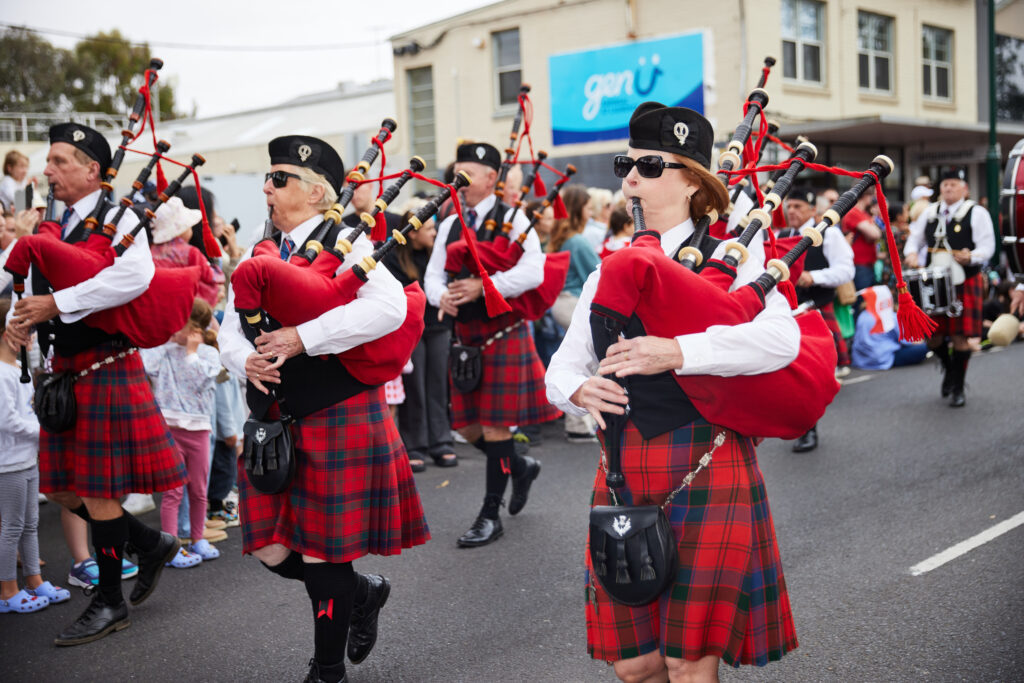
Scottish
For hundreds of years Scots have emigrated all over the world, bringing with them their music, dance and song, ensuring their cultural heritage is preserved. Migration to Geelong peaked in the 1950’s with numbers in the Geelong community being in the hundreds.
The Geelong Scottish Community generally come together to celebrate their heritage through dance at significant festivals such as the Geelong Highland Gathering, Melbourne Metropolitan Highland gatherings, the National Celtic Festival in Portarlington and other multicultural concerts.
Well known Scottish traditions of dance, pipe, drums and tartan are alive and well in the Geelong region, keeping young people involved and proving a favourite drawcard at festivals like Pako Festa each year.
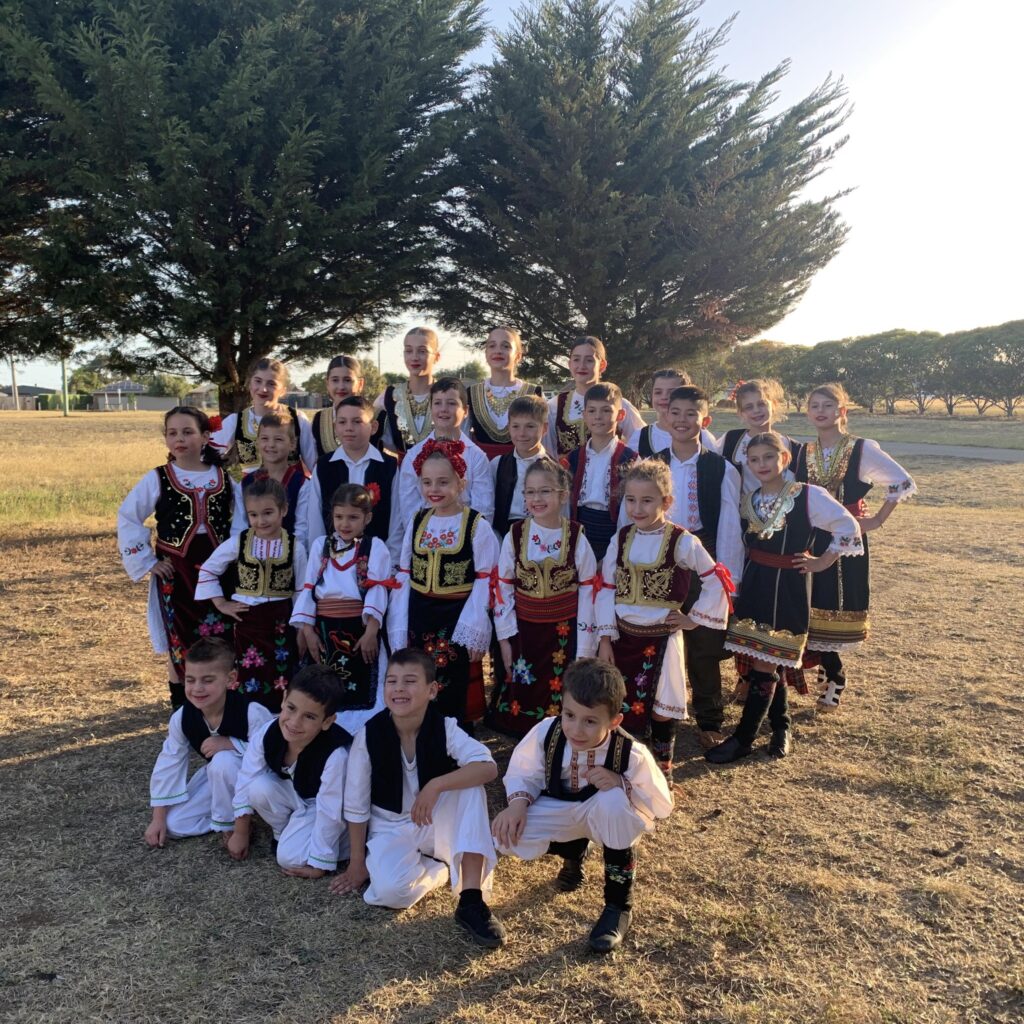
Serbian
Our Narrative
Since the late 1950s, our organisation has been an integral part of the Geelong community, findings its permanent home at 122 Ballarat road in Hamlyn Heights in 1961. A dedicated family of committees and subcommittees oversees our overall administration, ensuring its seamless operation:
- Managing Committee
- Building & Maintenance Committee
- Organising Committee
- Oversight Committee
Over the years, our organisation has evolved, giving rise to various member groups that contribute to the rich tapestry of our community:
- Circle of Serbian Sisters (Women’s Group)
- Pensioner’s Group ‘Saint Nikola’
- Folk Dancing Group’ Sumadija’
- Playgroup ‘Free Kids’
- Serbian Language School
- Norlane West Soccer Club
- Serbian Golf Club
The growth of these groups and memberships has been a testament to our vibrant community spirit. In the late 1990s, recognising the need for improvements, we embarked on a journey of enhancements, upgrading our kitchen, storage facilities and bathroom facilities. A thoughtful extension to the rear of the main building added a smaller room, outdoor toilet amenities and disability carparks.
Our community is every dynamic, and in the spirit of continuous improvement, we are currently involved in a multi-dwelling construction project and the redevelopment of our existing building.
We invite you to experience the warmth and energy of our community firsthand. Visit us at 122 Ballarat road and become a part of our thriving, ever-evolving story.
The majority of Serbians follow the Eastern Orthodox Christian faith, and religious traditions play a central role in daily life. Many festivals and customs are linked to the Orthodox calendar, with Easter being one of the most important and widely celebrated.
Slava – is a unique Serbian tradition and celebration of a family’s patron saint. Families honour their patron saint with special rituals, prayers and a festive meal. It is a deeply cherished tradition that fosters a sense of continuity and identity of the Serbian people and a family’s descendants.
Traditional Serbian folk music and dance, characterised by soulful melodies and intricate rhythms, is an integral part of the cultural heritage. Folk dances, such as kolo, which will be performed at the Pako Festa, and are typically performed during celebrations and social gatherings, bring communities together in rhythmic harmony.
In essence, Serbia’s customs and traditions form a cultural mosaic that honours the past while embracing the present, creating a unique and vibrant tapestry that defines the Serbian way of life.
Serbian hospitality is legendary. Guests are warmly welcomed with open arms, and offering food and drinks is a common way to express generosity. Sharing a meal is a significant social ritual, often accompanied by lively conversation and laughter.
Serbia’s national brandy, rakija, holds a special place in social customs. It is often shared among friends and family during celebrations or as a gesture of hospitality. Homemade rakija is particularly cherished, and each family may have its unique recipe.
Serbian cuisines are known for their hearty and flavourful dishes, often utilising locally sourced ingredients. Some of the more popular traditional Serbian delectables are:
- Ćevapi – these small, grilled minced meat sausages, typically made from beef and pork, are a Serbian culinary staple, often served with lepinje (flatbread), chopped onions, and a red pepper relish called ajvar or kajmak (creamy dairy product).
- Sarma – Cabbage leaves stuffed with a mixture of minced meat, rice, and spices, sarma is a beloved dish, especially during festive occasions. The rolls are cooked in a savory sauerkraut or tomato-based broth, imparting a distinctive flavour.
- Pita – is a flaky pastry filled with various ingredients such as cheese, meat, potatoes, or pumpkin. It comes in different shapes and sizes, and each region may have its variation.
Find us on Facebook – https://www.facebook.com/profile.php?id=100066695471380
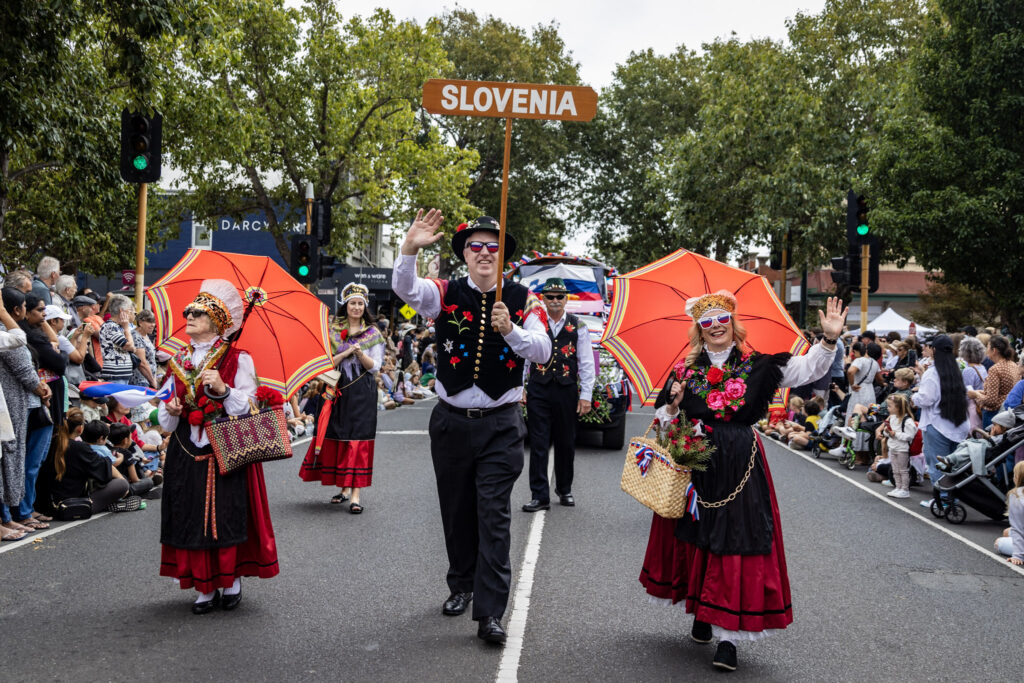
Slovenian
The Slovenian Cultural & Sports Association was established in November 1955, to form a social and cultural centre for the small and dynamic Slovenian community in Geelong. The club began with social gatherings, and singing and is believed to have started the first Slovenian choir in Australia.
An active drama group performs in the club and original exhibitions are organised, often for multicultural events in Geelong. In 1975 a club hall was built by members, which was expanded in 1984 and includes a large bowling alley with six lanes.
A new initiative in May 2010 launched the reintroduction of Slovenian language classes held at the club, which now runs two classes, primary and secondary to adult level, with 23 students enrolled.
The Slovenian Cultural & Sports Association was established in November 1955, to form a social and cultural centre for the small and dynamic Slovenian community in Geelong. The club began with social gatherings, and singing and is believed to have started the first Slovenian choir in Australia.
An active drama group performs in the club and original exhibitions are organised, often for multicultural events in Geelong. In 1975 a club hall was built by members, which was expanded in 1984 and includes a large bowling alley with six lanes.
A new initiative in May 2010 launched the reintroduction of Slovenian language classes held at the club, which now runs two classes, primary and secondary to adult level, with 23 students enrolled.

South Sudanese
The South Sudanese have recently gained their independence, and as the situation in the country is gradually stabilising, many are returning there. The Sudanese Women’s Group continues to meet on Fridays at Cloverdale Community Centre for cultural and educational activities. South Sudanese community members are also engaged in local sports, with younger members attending camps at Cottage by the Sea and Licola.
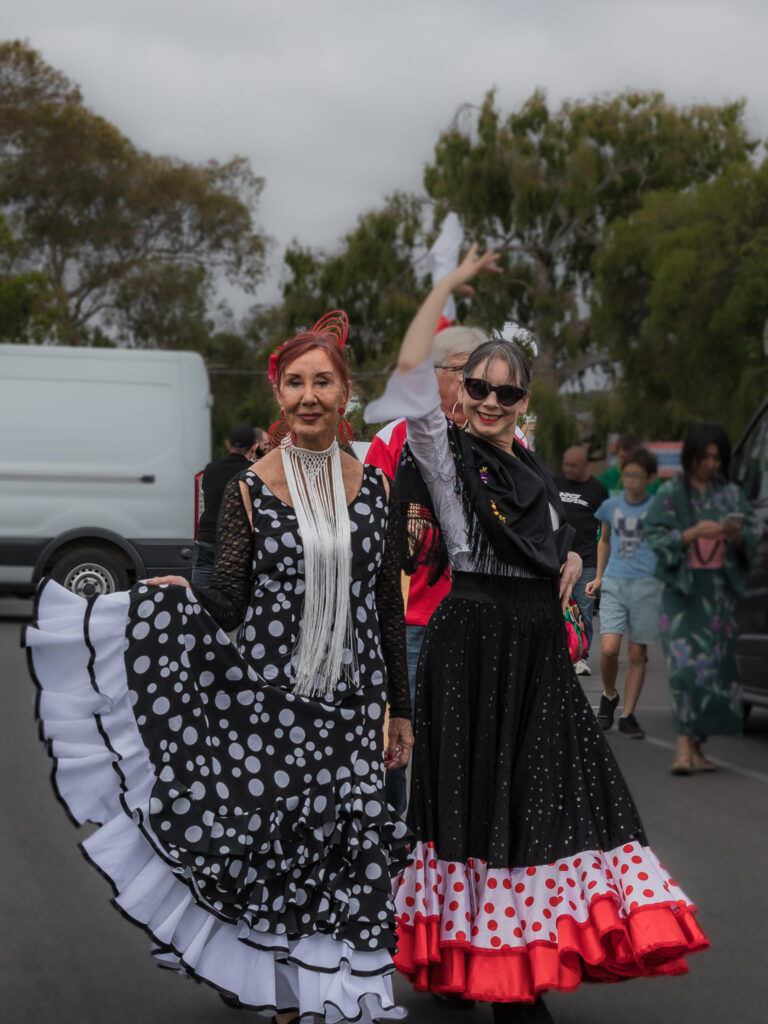
Spanish
The Geelong Spanish Community was established in 1980, with club activities operating from a community hall at the Hope Centre in Norlane. The first Spanish started arriving in Geelong around 1956 and now have a small community in Geelong, with approximately 190 members.
The AndaLucia Spanish Dancing Group of Geelong was formed in 1978 and performed for the first time at Pako Festa 1983.
Their Flamenco and Spanish dancing classes at D.W. Hope Centre are open to all:
- Beginners (Adults) Monday 7.00 – 8.00pm
- Intermediates (Adults) Monday 6.00 – 7.00 pm
- Intermediates (Adults) Wednesday 6.00 – 7.00pm
- Advanced (Adults) Wednesday 7.00 – 8.30pm
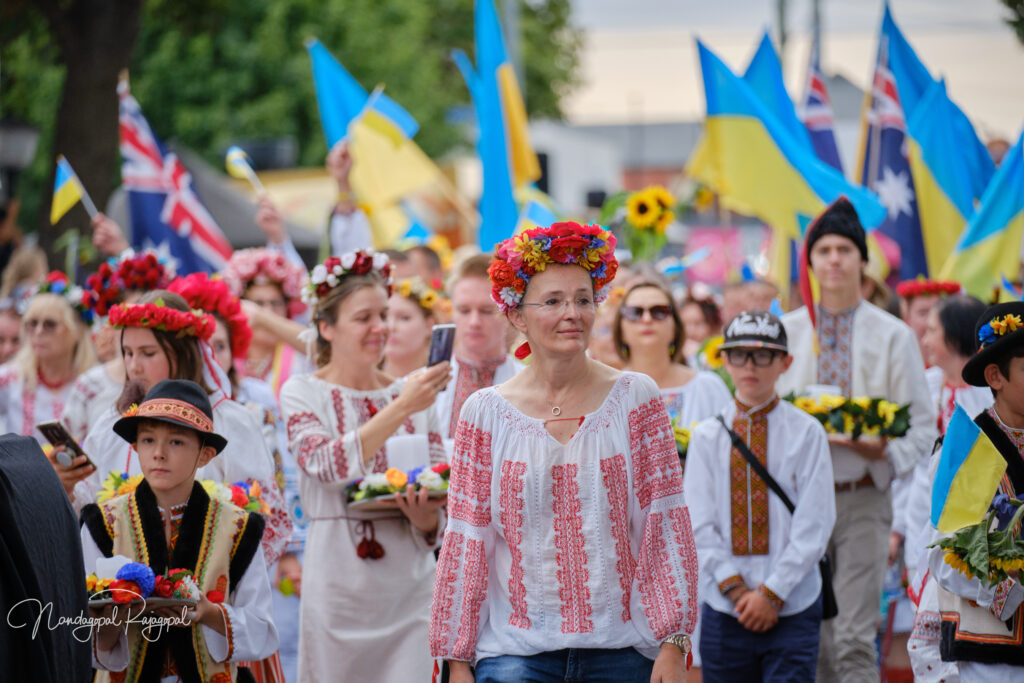
Ukrainian
The Ukrainian community in Geelong has been part of Pako Festa since the very first year. Over time, participation has included the street parade, food stalls, Ukrainian dancing, fashion parades and craft displays. This has included members of the Association of Ukrainians, the Womens’ Association, Youth Association members, church members, dancing groups and Ukrainian School children.
Ukraine has many rich customs and traditions such as Easter egg pysanky – eggs drawn on with wax to create a pattern and then dyed. This thousands of years old tradition is a favourite with children and families alike. Look out for the local Ukrainian community experience at Easter time in 2024.
The most famous traditional Ukrainian dishes are varenyky (dumplings), borshch (beetroot soup), holubtsi (cabbage rolls). There can be hundreds of different Ukrainian recipes for one dish. The way of cooking differs from region to region and each family usually has its own formula for a delicious dish.
Ukrainian ceremonial food is also very rich and diverse: kutia, a sweet wheat grains-based dish with poppy seeds, nuts and honey, is eaten on Christmas Eve. For Easter, Ukrainians bake paska, a sweet bread, and colour Easter eggs called krashanky.
Korovai is a traditional intrinsically decorated ritual bread for weddings.
Keep an eye out for our Mama’s Market to be held on the Saturday just before Mother’s Day in May.
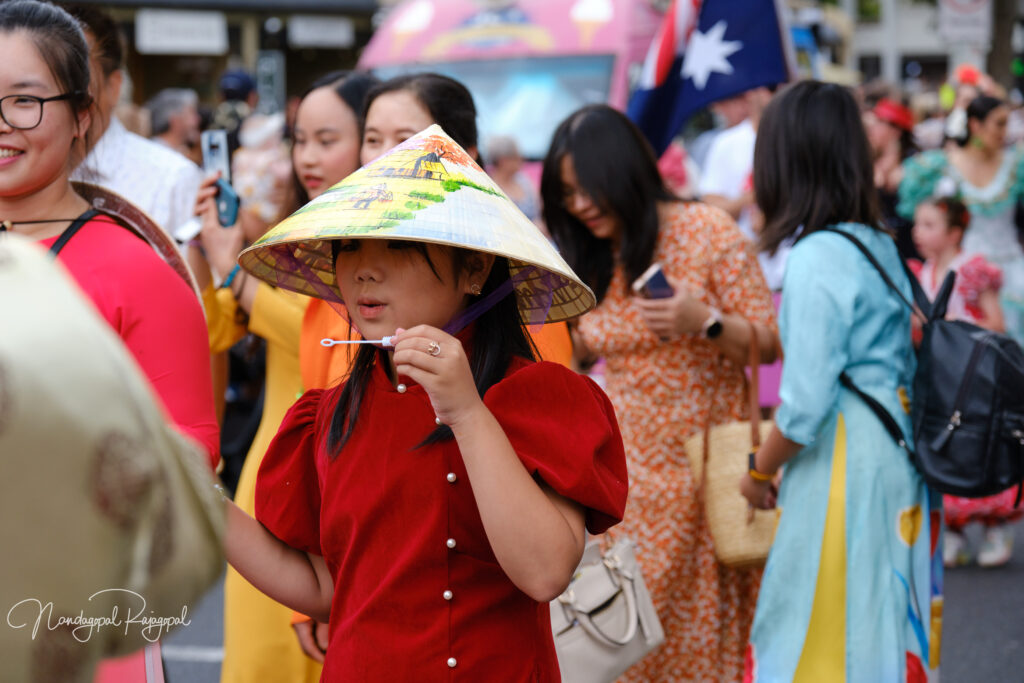
Vietnamese
Vietnamese People of Geelong is a non-for-profit organisation that represents that growing Vietnamese community in Geelong and celebrates Vietnamese culture and people without any political or religious agenda.
Vietnamese culture has many wonderful customs and traditions that honour ancestors, and highlight the importance of family and community. One of the more commonly known festival is Tet or Lunar New Year.
Pho, cha gio, banh mi, bun bo Hue are only a few examples of Vietnamese cuisine. Like many other cultures, Vietnamese food is the heart of cultural identity and the servings are traditionally very generous size.
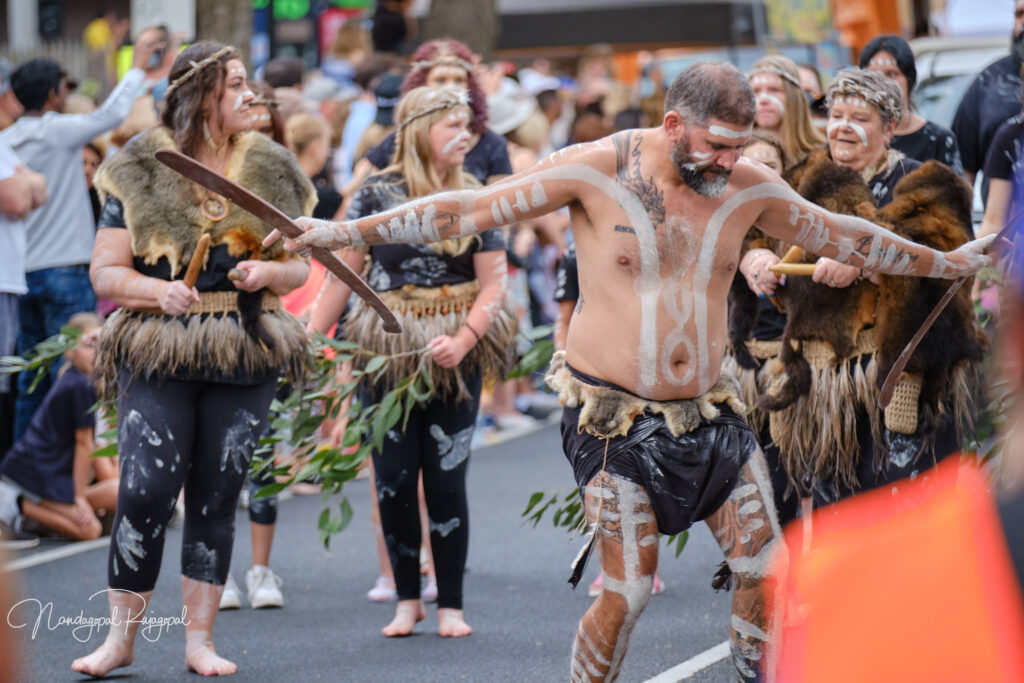
Wathaurong Aboriginal
Co-operative
Wathaurong Aboriginal Co-operative was officially incorporated in 1980, but started in the late 1970’s when local Aboriginal community members met in their homes, around the kitchen table, discussing their shared vision of forming an organisation that could be a place for the Aboriginal community to come together.
More than 40 years on, the Co-operative has grown from kitchen tables to a community organisation that values Strong Culture, Strong Community and Strong Country. With a health service, children’s service, youth and Elders services, Wathaurong Aboriginal Co-operative offers cultural connection and support for Aboriginal and Torres Strait Islander people in the region from birth to dreaming.
Wathaurong Aboriginal Co-operative provides services to Aboriginal & Torres Strait Islander people living on Waddawurrung, Gulidjan, Gadubanud and Boonwurrung Countries.
Unfortunately through colonisation and ongoing policies of discrimination, many Aboriginal customs and traditions have been lost over the years. We are privileged at Wathaurong Aboriginal Co-operative to have an organisation that centres culture in everything that we do, and allows our community to come together and practice culture in safe spaces. A Welcome to Country and Smoking Ceremony is a very important cultural custom, where a Traditional Owner of the Country that you are visiting will welcome you to their lands and give you safe passage to conduct business. The Smoking Ceremony is a way to cleanse and remove bad murrups, or spirits, to make sure you are entering the Country with good intentions and are agreeing to care for the Country while visiting.
Prior to colonisation, Aboriginal people were hunter-gatherers, and lived off the land. They would forage for nutrient-rich and high fibre ingredients such as native herbs, spices, fruit, seeds and nuts. Protein came from meat from native animals like kangaroo and emu.
In coastal areas, seaweed was also a valuable source of food.
Website: www.wathaurong.org.au
Facebook: https://www.facebook.com/wathaurong
Instagram: https://www.instagram.com/wathaurong/
Phone number: (03) 5277 0044
Wathaurong Aboriginal Co-operative hosts a Welcome to Country and Smoking Ceremony every Monday morning at 9:30am in the dance circle at 62 Morgan Street, North Geelong. All are welcome to attend and be part of this ceremony, it is a deadly way to start off the week and cleanse your spirit.
For more upcoming events visit Wathaurong events page: https://wathaurong.org.au/events/
or sign up for our digital newsletter: https://wathaurong.org.au/sign-up-to-our-newsletter/

